Renewable Energy Sources
Uncover Dramatic Energy Savings From Air Conditioning Heat Pumps

Finally, an article that reveals the remarkable energy savings possible through the use of air conditioning heat pumps.
Prepare to be amazed as we delve into the importance of seasonal performance, understand the workings of these efficient devices, and explore the key factors that affect their energy efficiency.
Get ready to maximize your savings with heat pump technology and discover tips for optimizing their seasonal performance.
Real-life case studies will demonstrate the dramatic impact these pumps can have on your energy consumption.
Key Takeaways
- Seasonal performance and efficiency of heat pumps are important for maximizing energy savings.
- Choosing heat pumps with higher SEER and HSPF ratings ensures greater energy savings throughout the year.
- Regular maintenance, proper installation, and advanced technologies can improve the performance of heat pumps.
- Utilizing heat pumps can lead to significant cost savings, reduced energy consumption, and environmental benefits.
The Importance of Seasonal Performance
We’ve discovered that seasonal performance is crucial in maximizing energy savings with air conditioning heat pumps. When it comes to optimizing savings and maximizing efficiency, understanding the importance of seasonal performance is key.
Air conditioning heat pumps operate differently depending on the season, and their performance can vary significantly. Seasonal Energy Efficiency Ratio (SEER) and Heating Seasonal Performance Factor (HSPF) are metrics that measure the efficiency of heat pumps during cooling and heating seasons, respectively.
By choosing a heat pump with a higher SEER and HSPF rating, you can ensure greater energy savings throughout the year. Additionally, regular maintenance and cleaning of the heat pump can improve its performance and efficiency.
Taking these factors into consideration will help you make informed decisions to maximize your energy savings and optimize the performance of your air conditioning heat pump.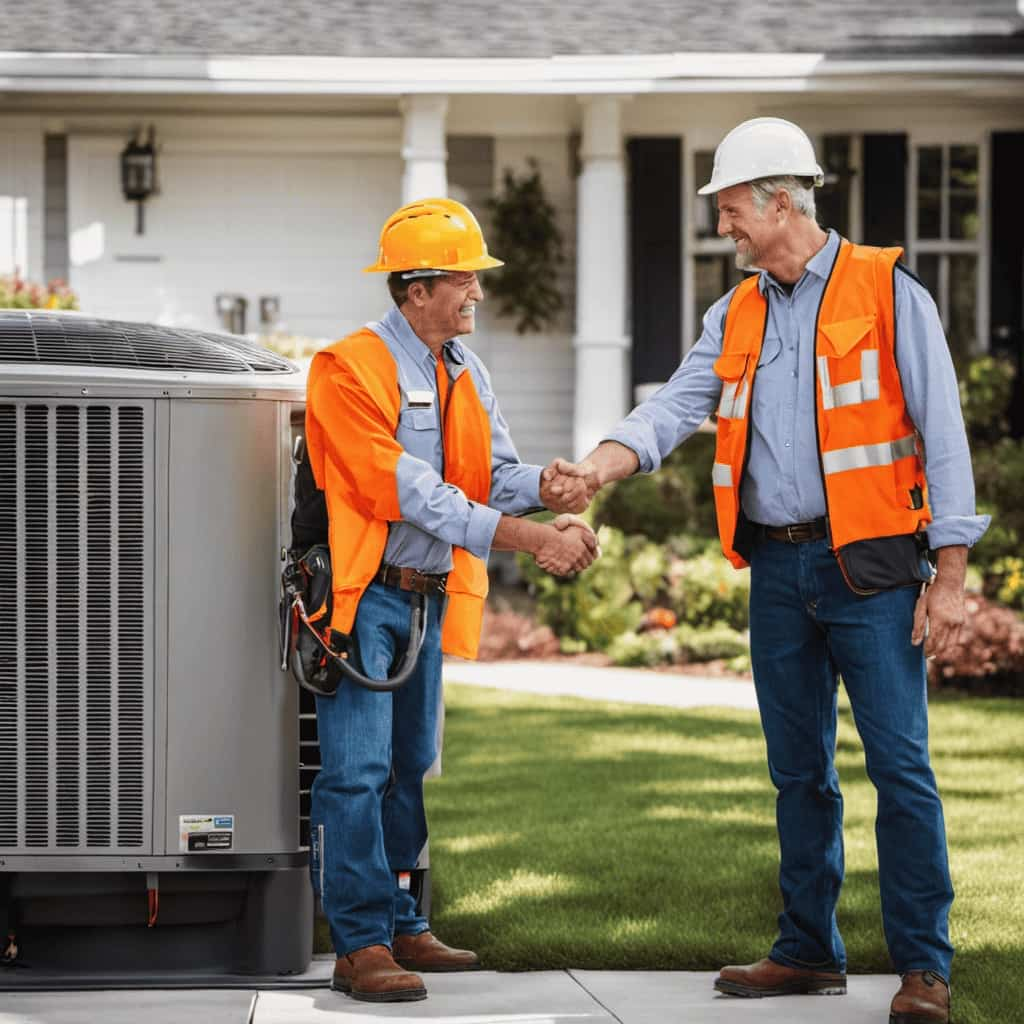
Understanding Air Conditioning Heat Pumps
When it comes to understanding air conditioning heat pumps, there are three key points to consider.
First, the efficiency of heat pumps is significantly higher compared to traditional HVAC systems, allowing for substantial energy savings.
Second, these energy savings translate into cost savings for homeowners, as heat pumps can reduce electricity bills by up to 50%.
Finally, using air conditioning heat pumps also has environmental benefits, as they produce fewer greenhouse gas emissions compared to other cooling options.
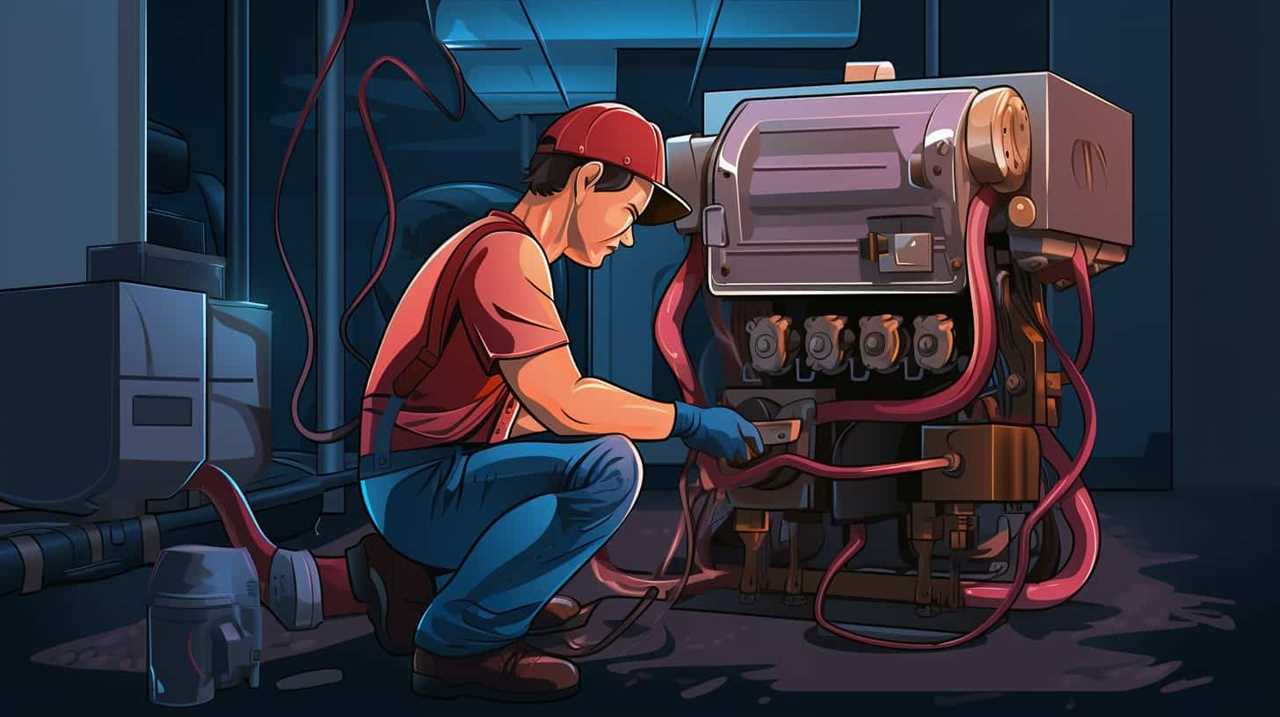
Efficiency of Heat Pumps
Understanding the efficiency of heat pumps is essential for maximizing energy savings and optimizing air conditioning performance. Heat pump efficiency is measured by the Coefficient of Performance (COP), which represents the ratio of heat output to energy input. A higher COP indicates better efficiency and lower energy consumption.
Improving the performance of heat pumps can be achieved through various means, such as proper installation, regular maintenance, and using advanced technologies. For instance, variable-speed compressors and smart thermostats can significantly enhance efficiency by adjusting the system’s output to match the required cooling load.
Additionally, improving insulation and minimizing air leaks can reduce the workload on the heat pump, further improving its efficiency.
Understanding and maximizing the efficiency of heat pumps not only reduces energy consumption but also leads to substantial cost savings potential.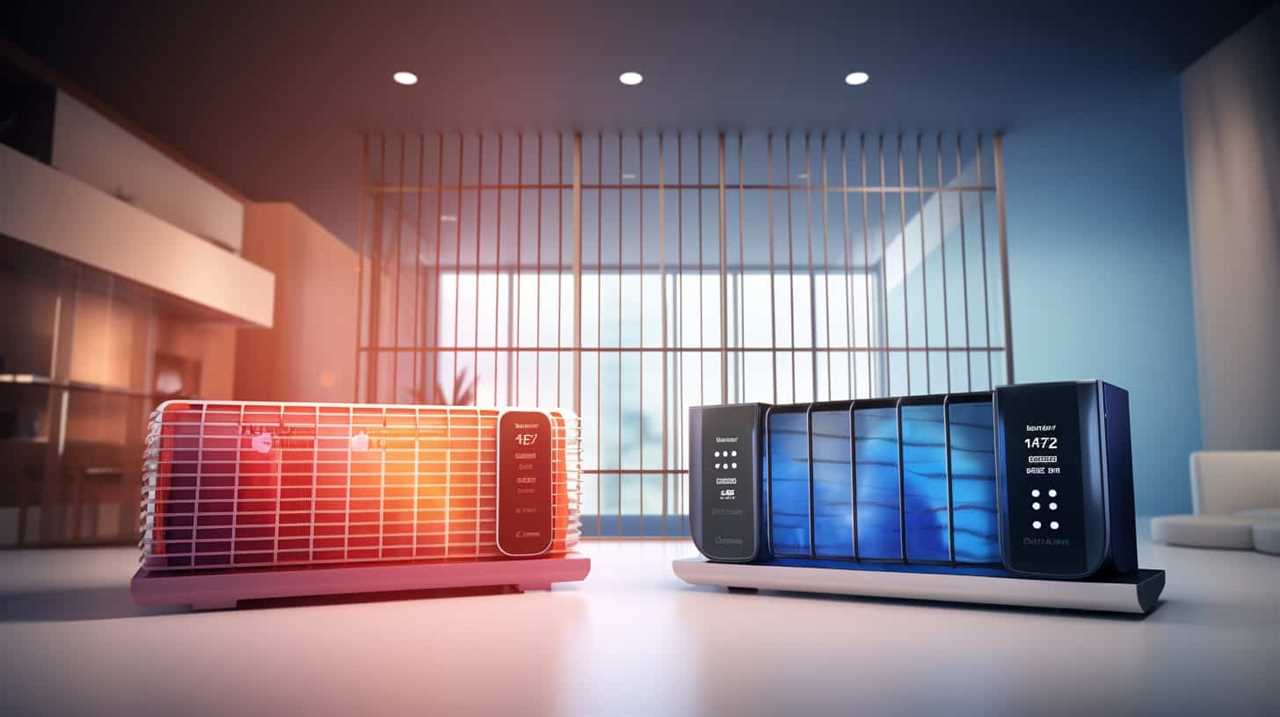
Cost Savings Potential
By optimizing the efficiency and performance of air conditioning heat pumps, we can achieve significant cost savings potential. Conducting a cost analysis can help us understand the financial benefits of using these heat pumps. One key factor to consider is energy consumption. Air conditioning heat pumps are designed to be highly efficient, meaning they use less energy to provide the same level of cooling compared to traditional air conditioning systems. This translates into lower electricity bills and reduced overall energy costs. To illustrate this, let’s look at a cost comparison between a standard air conditioner and an air conditioning heat pump:
| Standard Air Conditioner | Air Conditioning Heat Pump | |
|---|---|---|
| Energy Usage | High | Low |
| Electricity Bill | High | Low |
| Overall Energy Costs | High | Low |
As you can see from the table, an air conditioning heat pump offers substantial cost savings potential by reducing energy consumption and lowering electricity bills. By investing in these energy-efficient systems, not only can you save money, but you can also contribute to a more sustainable and eco-friendly environment.
Environmental Benefits
We can have a positive impact on the environment by utilizing air conditioning heat pumps due to their energy-efficient design and reduced carbon emissions.
Air conditioning heat pumps are an eco-friendly alternative to traditional cooling systems, as they use less electricity and produce fewer greenhouse gas emissions.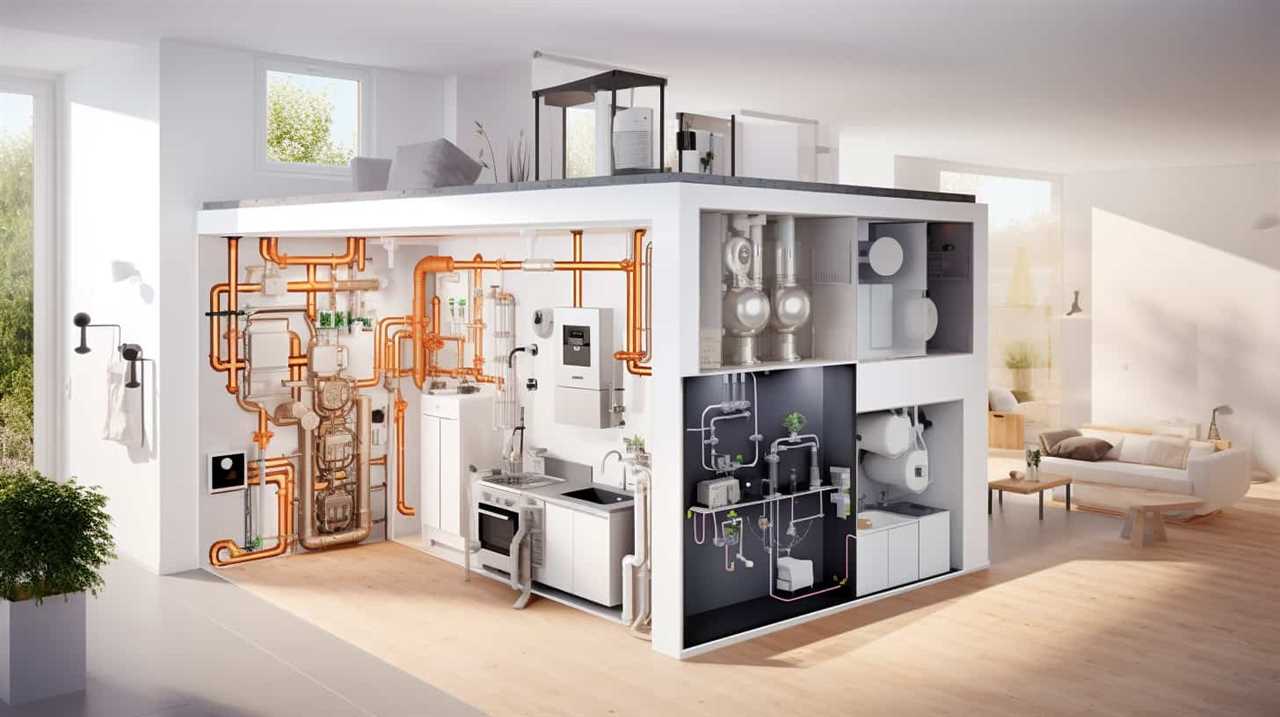
By reducing our carbon footprint, we contribute to the fight against climate change and protect the planet for future generations.
These heat pumps operate by transferring heat rather than generating it, making them more energy-efficient and sustainable.
According to studies, air conditioning heat pumps can reduce energy consumption by up to 50% compared to conventional air conditioners. This not only saves money but also helps to conserve natural resources and promote sustainable cooling solutions.
Key Factors Affecting Energy Efficiency
Let’s delve into the factors that impact the energy efficiency of air conditioning heat pumps. To help you understand the importance of energy efficiency, here are some key factors to consider:
Proper maintenance: Regular maintenance ensures that your heat pump is running efficiently, minimizing energy consumption.
Insulation and sealing: Good insulation and sealing of your home prevents heat loss in winter and heat gain in summer, reducing the workload on your heat pump.
Thermostat settings: Setting your thermostat at an optimal temperature can significantly reduce energy usage.
Size of the heat pump: Choosing the right size of heat pump for your space is crucial. An oversized or undersized unit can result in inefficient operation and higher energy consumption.

Maximizing Energy Savings With Heat Pump Technology
To effectively maximize energy savings, we should regularly maintain and optimize the performance of our heat pump technology. By maximizing the performance of our heat pumps, we can ensure energy efficient operation and significant cost savings.
One way to achieve this is by scheduling regular maintenance checks to ensure that all components are working efficiently. This includes cleaning or replacing filters, checking refrigerant levels, and inspecting the system for any potential issues.
Additionally, optimizing the settings of our heat pump can also contribute to maximizing performance and energy efficiency. Adjusting the thermostat to appropriate temperatures and utilizing programmable features can help reduce energy consumption.
By prioritizing the maintenance and optimization of our heat pump technology, we can achieve optimal performance and energy savings, benefiting both our wallets and the environment.
As we strive to maximize energy savings with our heat pump technology, it’s also important to consider tips for optimizing seasonal performance.
Tips for Optimizing Seasonal Performance
When it comes to optimizing seasonal performance of air conditioning heat pumps, there are a few key tips to keep in mind.
First, efficient temperature settings can make a big difference in energy savings. By adjusting the temperature by just a few degrees, you can significantly reduce energy usage.
Additionally, utilizing a smart thermostat can help automate and optimize the cooling process, ensuring optimal performance and energy efficiency.
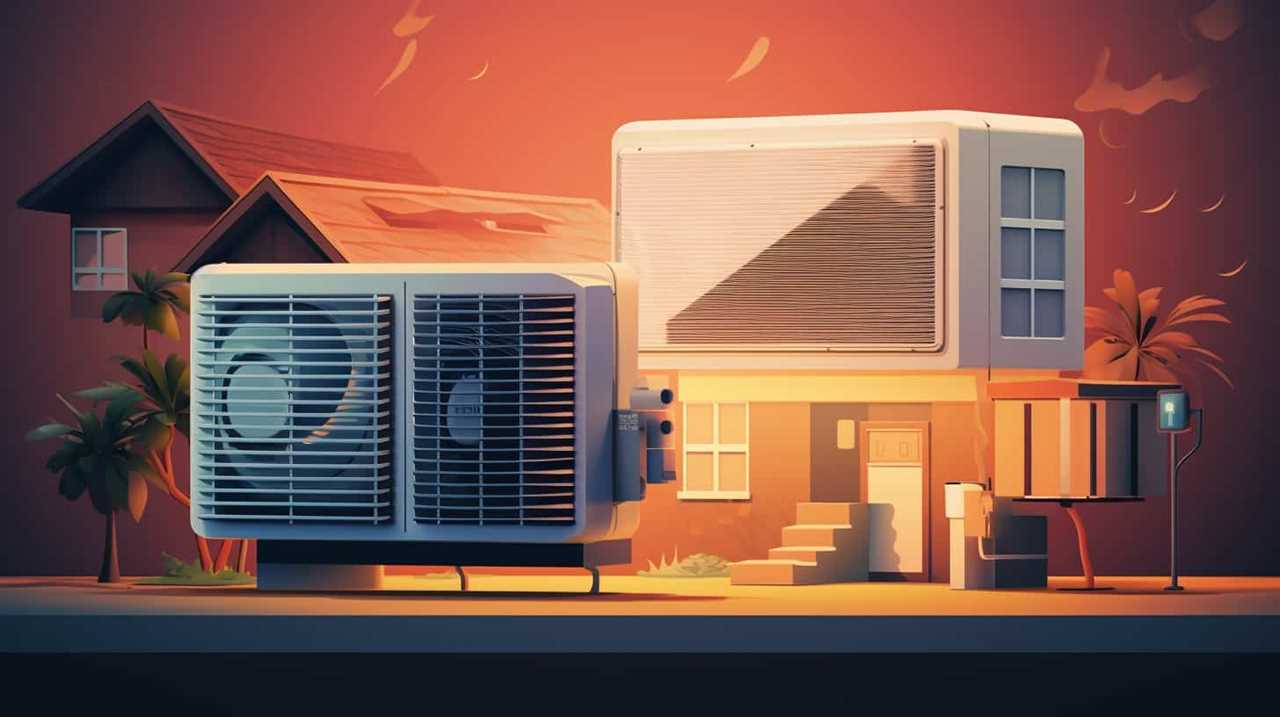
Efficient Temperature Settings
We can optimize the seasonal performance of our air conditioning heat pumps by efficiently adjusting the temperature settings. Here are some tips to help you achieve efficient temperature control and energy efficient cooling:
Set your thermostat to the highest comfortable temperature during the summer months. Each degree you raise the temperature can save you up to 3% on your cooling costs.
Use programmable thermostats to automatically adjust the temperature when you’re not at home. This can help you save energy and money.
Keep your indoor temperature consistent by avoiding frequent adjustments. This helps your air conditioning heat pump operate more efficiently and reduces energy consumption.
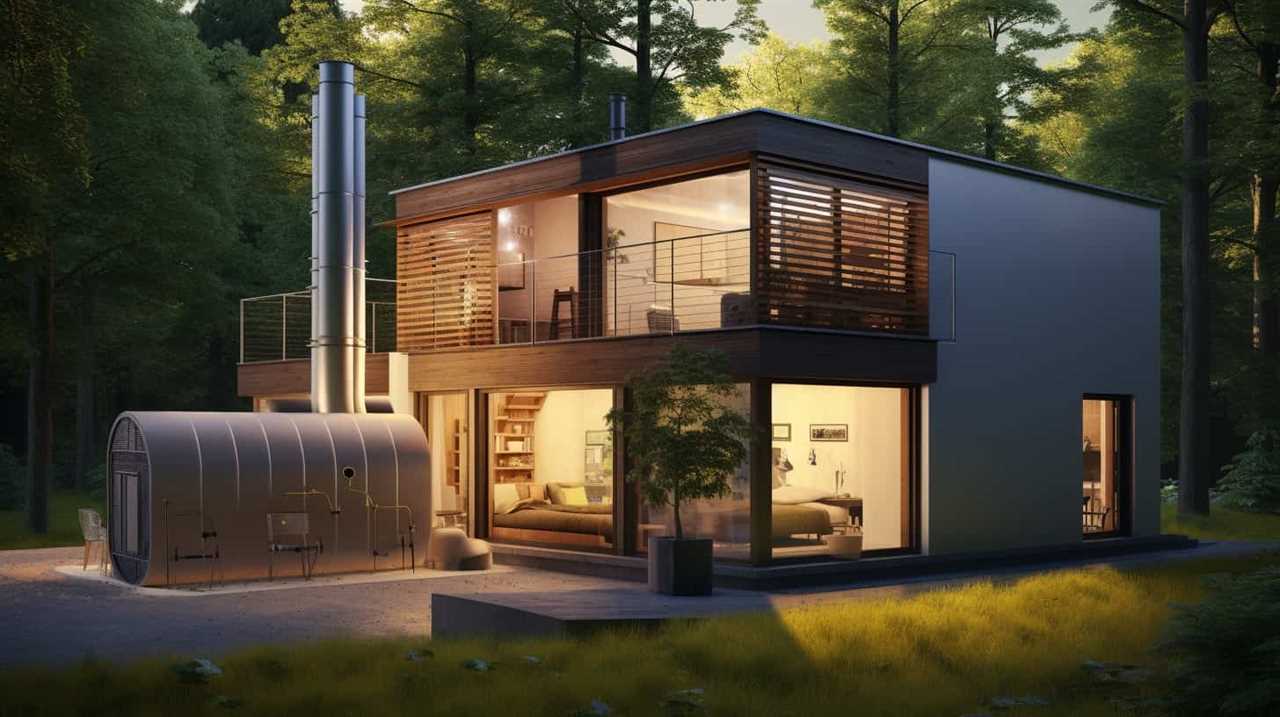
Consider using ceiling fans in conjunction with your air conditioning system. Fans can help circulate cool air and make your space feel more comfortable without relying solely on the AC.
Smart Thermostat Usage
Our smart thermostats can significantly optimize the seasonal performance of our air conditioning heat pumps. By integrating them into our smart home systems, we can take advantage of advanced features such as energy consumption monitoring. This allows us to track and analyze our energy usage, providing valuable insights for maximizing efficiency and reducing costs.
With real-time data on energy consumption, we can make informed decisions about temperature settings and scheduling, ensuring that our air conditioning heat pumps operate at their most efficient levels. By programming our smart thermostats to adjust temperatures based on occupancy patterns, weather conditions, and time of day, we can further enhance energy savings.
In the next section, we’ll explore real-life case studies that demonstrate the significant energy savings achieved through the use of smart thermostats.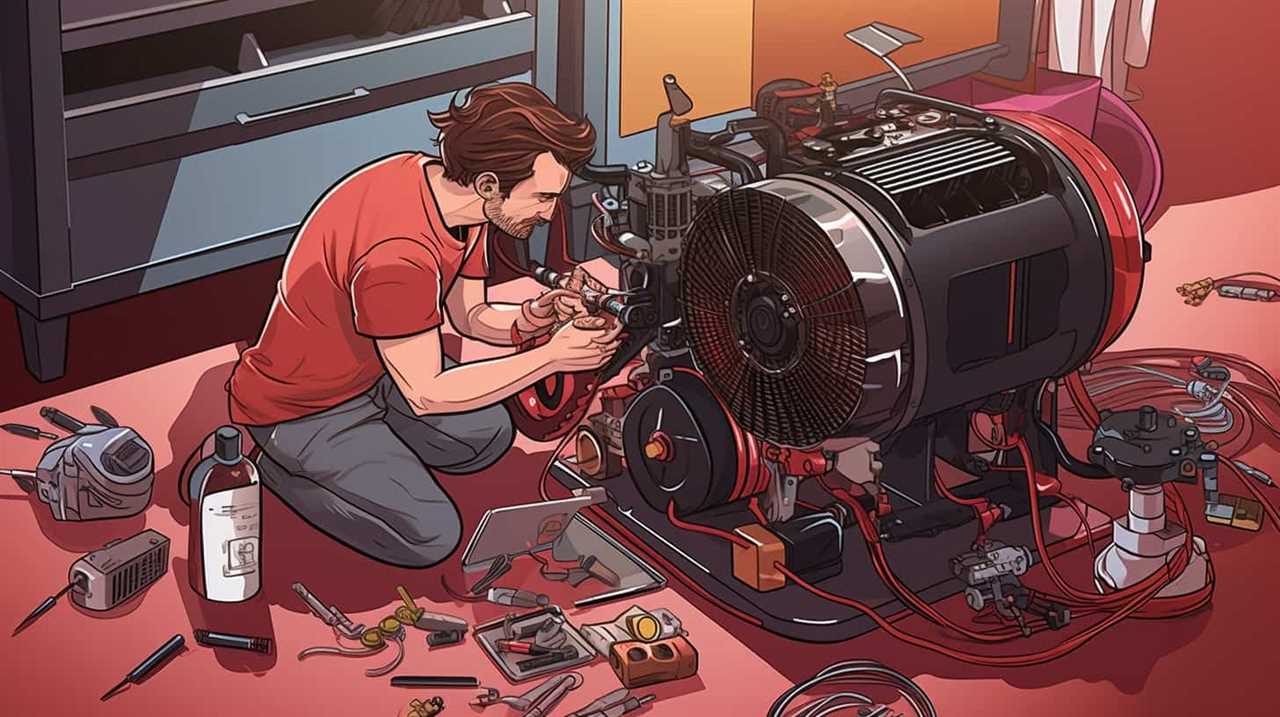
Case Studies: Real-Life Energy Savings Achieved
The case studies reveal the real-life energy savings achieved through air conditioning heat pumps. Here are some examples of the significant energy savings that have been achieved:
Case Study 1: A residential building in a hot climate reduced their energy consumption by 40% after installing an air conditioning heat pump. This resulted in substantial cost savings for the homeowners.
Case Study 2: A commercial office space saw a 30% decrease in their energy consumption by switching to air conditioning heat pumps. This not only reduced their environmental impact but also lowered their utility bills.
Case Study 3: A hotel chain implemented air conditioning heat pumps in all of their locations, resulting in an average energy savings of 25%. This allowed them to invest the saved money in improving guest experiences.

Case Study 4: A school district installed air conditioning heat pumps in their classrooms and saw a 20% reduction in energy usage. This allowed them to allocate more funds towards educational resources.
These real-life examples demonstrate the significant energy savings that can be achieved through the use of air conditioning heat pumps. Through careful energy consumption analysis, individuals and organizations can make informed decisions to reduce their energy usage and save money.
Frequently Asked Questions
Are There Any Rebates or Incentives Available for Installing Air Conditioning Heat Pumps?
Yes, there are rebates and financial incentives available for installing air conditioning heat pumps. These incentives can help offset the initial cost and promote energy-efficient solutions for a more sustainable future.
How Long Does It Typically Take for an Air Conditioning Heat Pump to Pay for Itself in Energy Savings?
It typically takes about 5-10 years for an air conditioning heat pump to pay for itself in energy savings. This makes it a cost-effective option in terms of long-term savings and sustainability.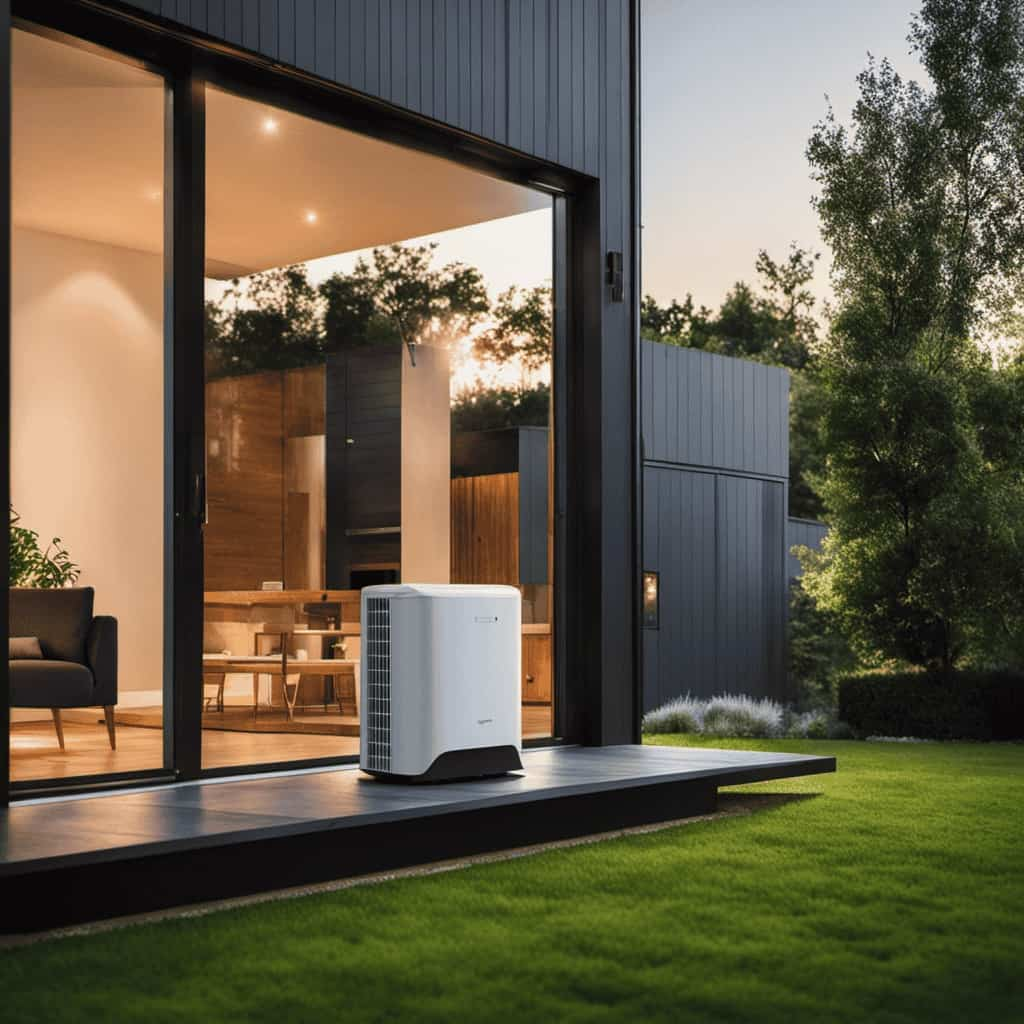
Can Air Conditioning Heat Pumps Be Used in All Climates, or Are They More Suitable for Specific Regions?
Air conditioning heat pumps have advantages in different climates, but they may not perform optimally in extreme weather conditions. It’s important to consider the climate and specific needs when deciding if they are suitable for a particular region.
Are There Any Maintenance Requirements or Regular Servicing Needed for Air Conditioning Heat Pumps?
Regular maintenance is necessary for optimal performance and energy efficiency of air conditioning heat pumps. This includes cleaning filters, checking refrigerant levels, and inspecting the system for any issues.
Can Air Conditioning Heat Pumps Be Used in Conjunction With Other Heating or Cooling Systems, Such as Furnaces or Central Air Conditioning Units?
Yes, air conditioning heat pumps can be used in conjunction with other heating or cooling systems, such as furnaces or central air conditioning units. We can integrate them with smart home technology and even use solar panels for more energy savings.
What are the Benefits of Using Heat Pumps for Air Conditioning?
Using heat pumps for air conditioning can bring numerous benefits. Unleashing the power of seasonal heat pumps leads to efficient cooling in summer and effective heating during winter. These systems rely on renewable energy sources, reducing reliance on fossil fuels. They also offer cost savings on energy bills, provide better indoor air quality, and contribute to a more sustainable environment.
Conclusion
In conclusion, air conditioning heat pumps offer significant energy savings when used efficiently.

For example, in a real-life case study, a homeowner was able to reduce their energy consumption by 30% by optimizing the seasonal performance of their heat pump system.
By understanding the importance of seasonal performance and implementing key strategies, individuals can maximize their energy savings and contribute to a more sustainable future.
Renewable Energy Sources
Experts Praise Renewable Energy Solutions for Heat Pumps

We have discovered a groundbreaking advancement in the field of heating and cooling.
Experts are praising renewable energy solutions for heat pumps, and for good reason. These innovative technologies not only provide efficient and cost-effective heating and cooling but also have a significantly lower impact on the environment.
From harnessing the power of solar energy to exploring geothermal and wind sources, we’re diving into the possibilities of renewable energy for heat pumps.
Join us as we explore these sustainable solutions and their promising benefits.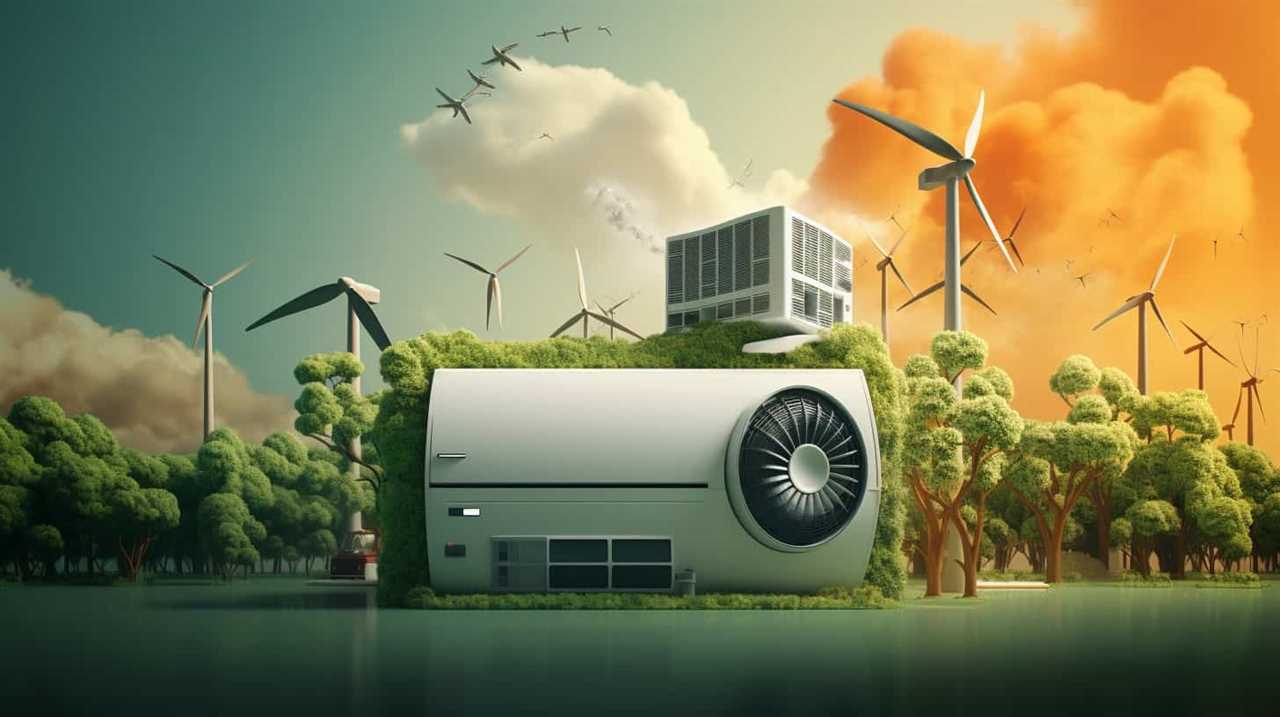
Key Takeaways
- Government incentives, such as tax credits and grants, are driving the increasing demand for renewable energy solutions for heat pumps.
- Heat pumps offer significant energy efficiency advantages compared to traditional heating systems, saving on energy bills and reducing carbon footprints.
- Renewable energy sources like solar, geothermal, wind, and biomass can power heat pumps, contributing to a greener future and lower energy costs.
- Heat pumps significantly decrease a building’s carbon footprint, improve air quality, and reduce environmental pollution.
The Growing Need for Renewable Energy Solutions
We believe that there’s a significant increase in the demand for renewable energy solutions. The importance of government incentives can’t be overstated in driving this demand. By offering financial benefits and support, governments can encourage businesses and individuals to transition to renewable energy sources.
These incentives can include tax credits, grants, and subsidies, which make renewable energy solutions more financially viable and attractive.
Moreover, the role of technology advancements can’t be ignored. Innovations in renewable energy technologies have made them more efficient, affordable, and accessible. Breakthroughs in solar power, wind turbines, and energy storage systems have revolutionized the renewable energy industry, making it a more reliable and sustainable alternative to traditional energy sources.
As technology continues to advance, the cost-effectiveness and efficiency of renewable energy solutions will only improve, further accelerating their adoption.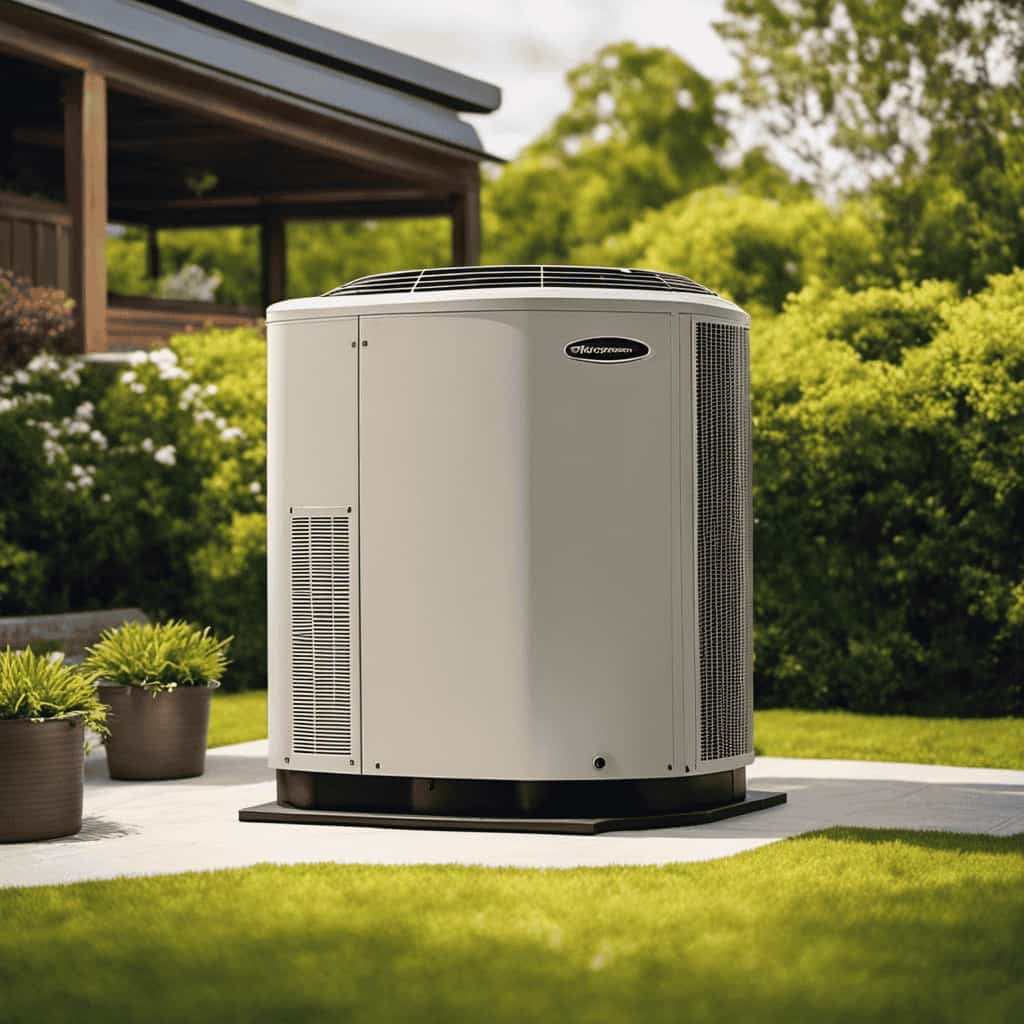
Understanding Heat Pumps and Their Benefits
When it comes to understanding heat pumps and their benefits, there are several key points to consider.
First, heat pumps offer significant energy efficiency advantages compared to traditional heating systems. This means that homeowners can save on their energy bills while reducing their carbon footprint.
Second, heat pumps provide environmental sustainability benefits by utilizing renewable energy sources such as air, water, or ground heat.
Lastly, heat pumps are also cost-effective in the long run, as they can provide both heating and cooling capabilities, eliminating the need for separate systems.
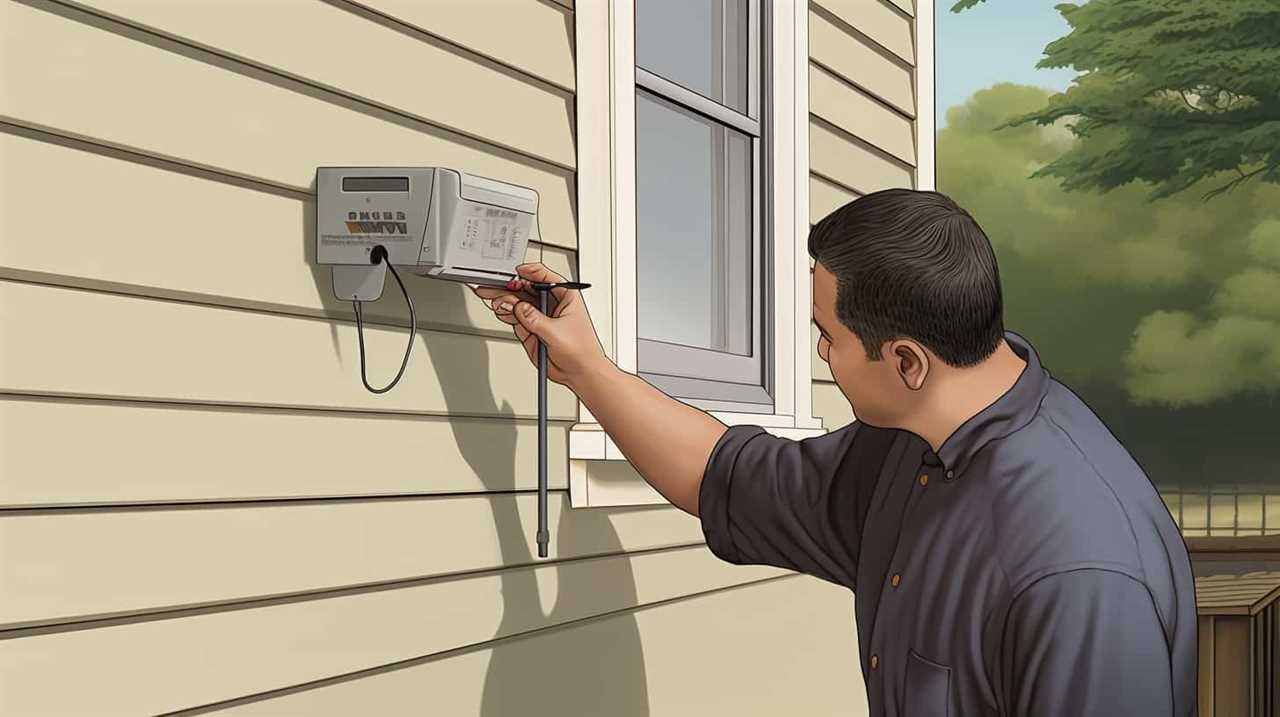
Energy Efficiency Advantages
Highlighting the energy-saving capabilities of heat pumps, experts commend their efficiency advantages in reducing carbon emissions. Heat pumps are known for their ability to transfer heat from one location to another, rather than generating heat directly. This process requires significantly less energy compared to traditional heating systems, resulting in substantial energy savings.
Additionally, heat pumps can be powered by renewable energy sources such as solar or geothermal energy, further reducing their carbon footprint. By leveraging these energy-efficient technologies, individuals and businesses can contribute to a greener future while enjoying the benefits of reduced energy costs.
The efficiency advantages of heat pumps make them a viable and innovative solution for those seeking sustainable heating and cooling options.
Environmental Sustainability Benefits
Experts commend the environmental sustainability benefits of heat pumps for their contribution to reducing carbon emissions and promoting renewable energy sources. Heat pumps are a sustainable solution that can significantly decrease a building’s carbon footprint. By utilizing renewable energy sources such as air, water, or ground, heat pumps effectively reduce greenhouse gas emissions and dependence on fossil fuels. This not only helps combat climate change but also improves air quality and reduces environmental pollution.
Heat pumps are highly efficient in converting energy, making them an environmentally friendly choice for heating and cooling needs. Additionally, heat pumps can also be integrated with other renewable energy systems such as solar panels, further enhancing their environmental benefits.
Cost-Effectiveness of Heat Pumps
We can examine the cost-effectiveness of heat pumps by comparing their energy savings to their initial installation costs. Heat pumps offer several efficiency advantages that make them a cost-effective solution for heating and cooling homes and buildings. Firstly, heat pumps have a high level of energy efficiency, meaning they can provide significant energy savings compared to traditional heating systems. Additionally, heat pumps can be powered by renewable energy sources such as solar or geothermal, further reducing operating costs and environmental impact. To illustrate the potential cost savings, consider the following table:
| Heating System | Initial Installation Cost | Annual Energy Savings |
|---|---|---|
| Heat Pump | $5,000 | $800 |
| Gas Furnace | $3,000 | $400 |
| Electric Heater | $1,500 | $200 |
As shown in the table, the heat pump offers the highest annual energy savings, making it a cost-effective solution in the long run.
Harnessing the Power of Solar Energy for Heat Pumps
Solar energy offers us a limitless and sustainable source of power for our heat pumps. By integrating solar energy into our heat pump systems, we can maximize efficiency and reduce our dependence on traditional energy sources. Here are three ways we can harness the power of solar energy for heat pumps:
-
Photovoltaic (PV) Panels: Installing PV panels on the roof or in the vicinity of the property allows us to capture sunlight and convert it into electricity to power the heat pump. This not only reduces our carbon footprint but also lowers energy costs.
-
Solar Thermal Systems: Utilizing solar thermal systems, we can directly heat the fluid in the heat pump, increasing its efficiency and reducing the need for additional energy sources. These systems use sunlight to heat the fluid, which is then circulated through the heat pump to provide heating or cooling.
-
Solar Heat Pumps: Solar heat pumps combine the power of solar energy with the efficiency of heat pumps. These systems use solar energy to drive the heat pump cycle, providing an environmentally friendly and cost-effective solution for heating and cooling.
Exploring Geothermal Energy as a Sustainable Solution
As we continue to explore sustainable solutions for heat pumps, it’s important to consider the potential of geothermal energy. Geothermal energy exploration offers a promising avenue for sustainable heating solutions.
Geothermal heat pumps utilize the Earth’s natural heat to provide both heating and cooling for residential and commercial buildings. This renewable energy source taps into the constant temperature of the ground, where temperatures remain relatively stable throughout the year. By harnessing this stable heat source, geothermal heat pumps can provide efficient and consistent heating, reducing reliance on fossil fuels and minimizing greenhouse gas emissions.
Additionally, geothermal energy is renewable and abundant, making it a viable long-term solution for sustainable heating.
Transitioning from geothermal energy exploration, let’s now delve into the topic of wind energy as a promising renewable source for heat pumps.
Wind Energy: A Promising Renewable Source for Heat Pumps
Wind energy is a cost-effective and sustainable option for powering heat pumps. With advances in technology and an increasing focus on renewable sources, harnessing the power of the wind has become a promising solution for meeting energy needs. Here are three reasons why wind energy is an excellent choice for heat pumps:
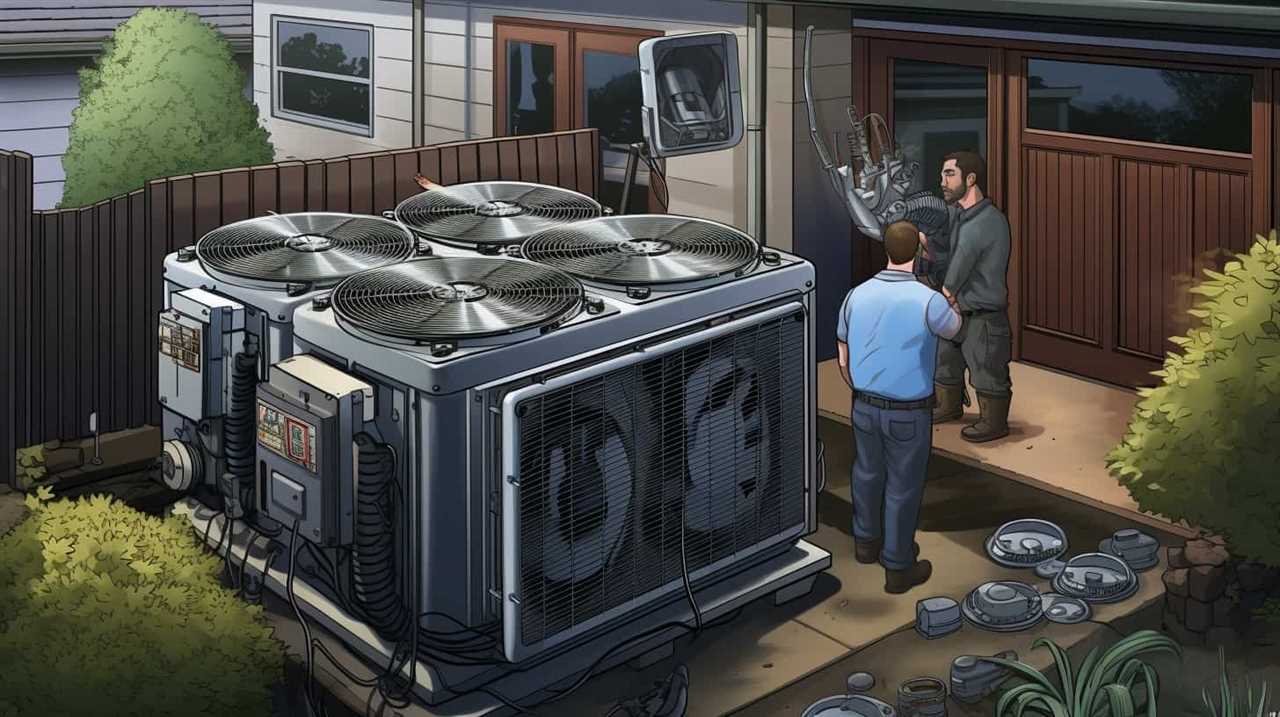
-
Abundant and renewable: Wind is a limitless resource that can be harnessed to generate electricity. Unlike fossil fuels, wind energy is a renewable source that doesn’t deplete over time.
-
Cost-effective: Once a wind turbine is installed, the cost of generating electricity from wind energy is relatively low. This makes it an attractive option for homeowners and businesses looking to reduce their energy costs.
-
Environmental benefits: Wind energy produces zero greenhouse gas emissions, making it a clean and sustainable alternative to traditional energy sources. By harnessing the power of the wind, we can significantly reduce our carbon footprint and mitigate the effects of climate change.
Transitioning from wind energy, let’s now explore biomass as a renewable fuel option for heat pump systems.
Biomass: A Renewable Fuel Option for Heat Pump Systems
Biomass is a sustainable heat source that has gained attention as a renewable fuel option for heat pump systems. It offers numerous benefits, including reducing greenhouse gas emissions and providing a reliable energy supply.
Biomass serves as a viable alternative to traditional fossil fuels, making it a promising solution for meeting heat demands while minimizing environmental impact.
Biomass: Sustainable Heat Source
While biomass is a renewable fuel option for heat pump systems, experts praise its sustainability as a heat source. Biomass refers to organic materials, such as wood pellets, agricultural residues, and dedicated energy crops, that can be burned to produce heat. Here are three reasons why biomass is considered a sustainable heat source:
-
Renewable: Biomass is derived from organic matter, which can be replenished through various means like reforestation and sustainable farming practices. This ensures a continuous supply of biomass for heat generation.
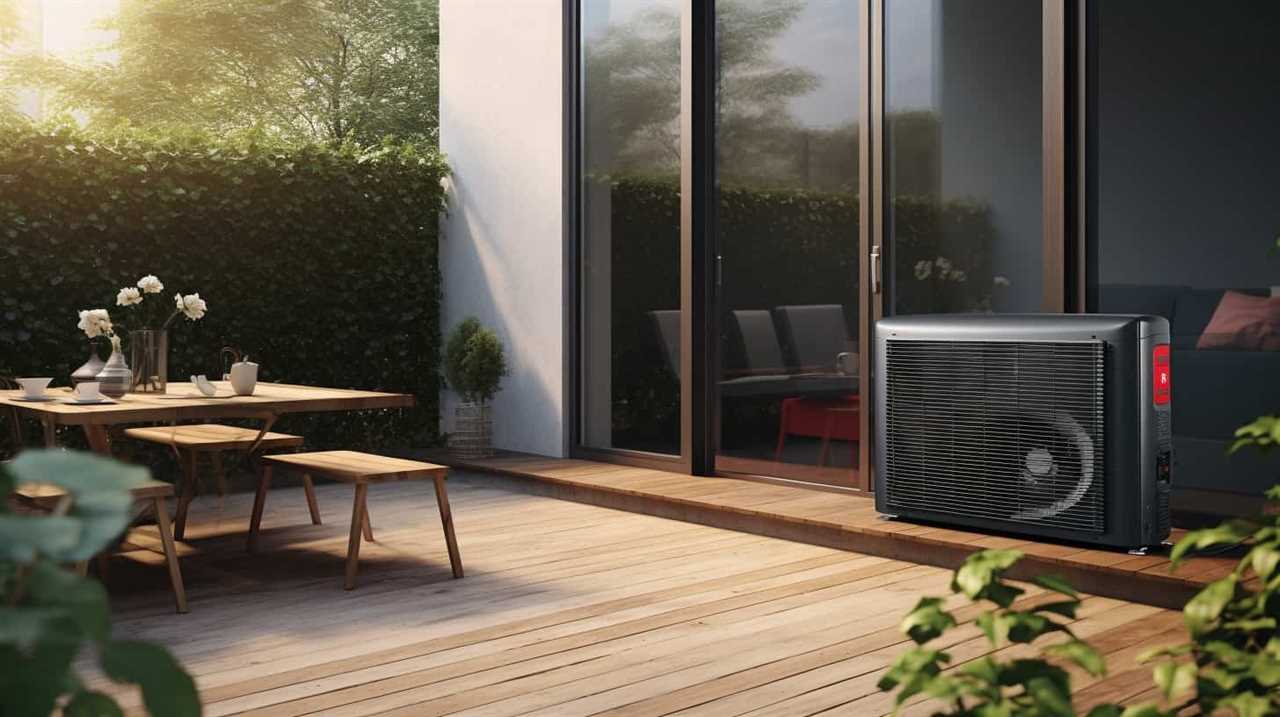
-
Carbon neutral: When biomass is burned, it releases carbon dioxide (CO2) into the atmosphere. However, the CO2 emitted is roughly equal to the amount absorbed by the plants during their growth phase. This makes biomass a carbon-neutral option, as it doesn’t contribute to the net increase of CO2 in the atmosphere.
-
Local availability: Biomass can be sourced locally, reducing dependence on fossil fuels and promoting regional economic growth. It provides an opportunity for communities to utilize their own sustainable resources for heat production.
With these benefits, biomass emerges as a promising renewable heat source for heat pump systems, contributing to a greener and more sustainable future.
Benefits of Biomass Fuel
We frequently praise the benefits of biomass fuel as a renewable option for heat pump systems.

Biomass fuel, derived from organic materials such as wood pellets, agricultural waste, and dedicated energy crops, offers several advantages in terms of sustainability and environmental impact.
Firstly, biomass fuel is a carbon-neutral energy source, as the carbon dioxide released during combustion is offset by the carbon absorbed during plant growth. This makes it a viable alternative to fossil fuels, reducing greenhouse gas emissions and mitigating climate change.
Additionally, biomass fuel is readily available and can be sourced locally, reducing dependence on imported energy.
Furthermore, the use of biomass fuel promotes the development of sustainable agriculture and forestry practices.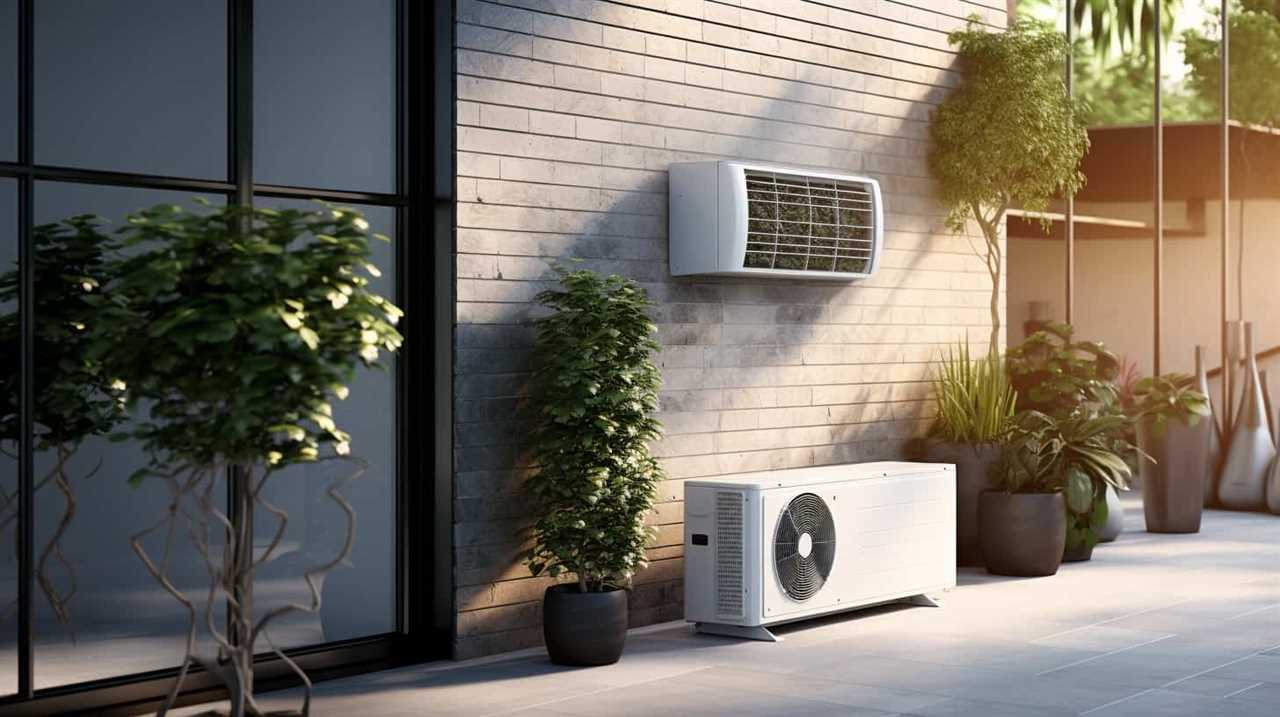
Transitioning to biomass fuel as a renewable energy alternative has the potential to revolutionize heat pump systems and contribute to a more sustainable future.
Biomass: Renewable Energy Alternative
We can achieve a more sustainable and efficient heat pump system by utilizing biomass as a renewable fuel option. Biomass refers to organic matter, such as wood pellets, agricultural waste, or dedicated energy crops, that can be burned to produce heat.
Here are three reasons why biomass is a viable fuel option for heat pump systems:
-
Renewable energy: Biomass is derived from organic materials that can be replenished, making it a renewable energy source. By using biomass as a fuel, we can reduce our dependence on fossil fuels and decrease greenhouse gas emissions.

-
Versatility: Biomass can be used in various forms, such as pellets, chips, or logs, making it adaptable to different heat pump systems. This flexibility allows for efficient utilization of biomass as a heat source.
-
Local availability: Biomass fuel options are often locally sourced, reducing transportation costs and promoting regional economic growth. By utilizing biomass heat sources, we can support local communities and reduce reliance on imported fuels.
Transition: Now that we’ve explored the benefits of biomass as a renewable fuel option, let’s move on to discussing hydroelectric power as an efficient energy source for heat pumps.
Hydroelectric Power: An Efficient Energy Source for Heat Pumps
Hydroelectric power has emerged as an efficient energy source for heat pumps in recent years. Its numerous benefits and high efficiency make it an attractive option for those seeking sustainable and innovative solutions.
Hydroelectric power offers several advantages when used as an energy source for heat pumps. Firstly, it is a renewable energy source, meaning it can be continuously replenished. Secondly, it produces minimal greenhouse gas emissions, making it an environmentally friendly option. Lastly, hydroelectric power plants have a long lifespan and can provide a reliable and stable source of energy for heat pumps.
Table: Hydroelectric Power Benefits for Heat Pumps
| Benefits | Description |
|---|---|
| Renewable Energy Source | Hydroelectric power is constantly replenished, ensuring a steady supply. |
| Low Greenhouse Gas Emissions | Hydroelectric power plants produce minimal emissions, reducing environmental impact. |
| Reliable and Stable | Hydroelectric power plants have a long lifespan and can provide consistent energy for heat pumps. |
Evaluating the Environmental Impact of Renewable Energy Solutions
When evaluating the environmental impact of renewable energy solutions, it’s important to consider their long-term sustainability and overall effectiveness. To conduct a thorough evaluation, a sustainability assessment can be carried out, taking into account the following factors:
-
Carbon footprint: Assessing the amount of greenhouse gas emissions produced throughout the lifecycle of the renewable energy solution, including manufacturing, installation, and operation.
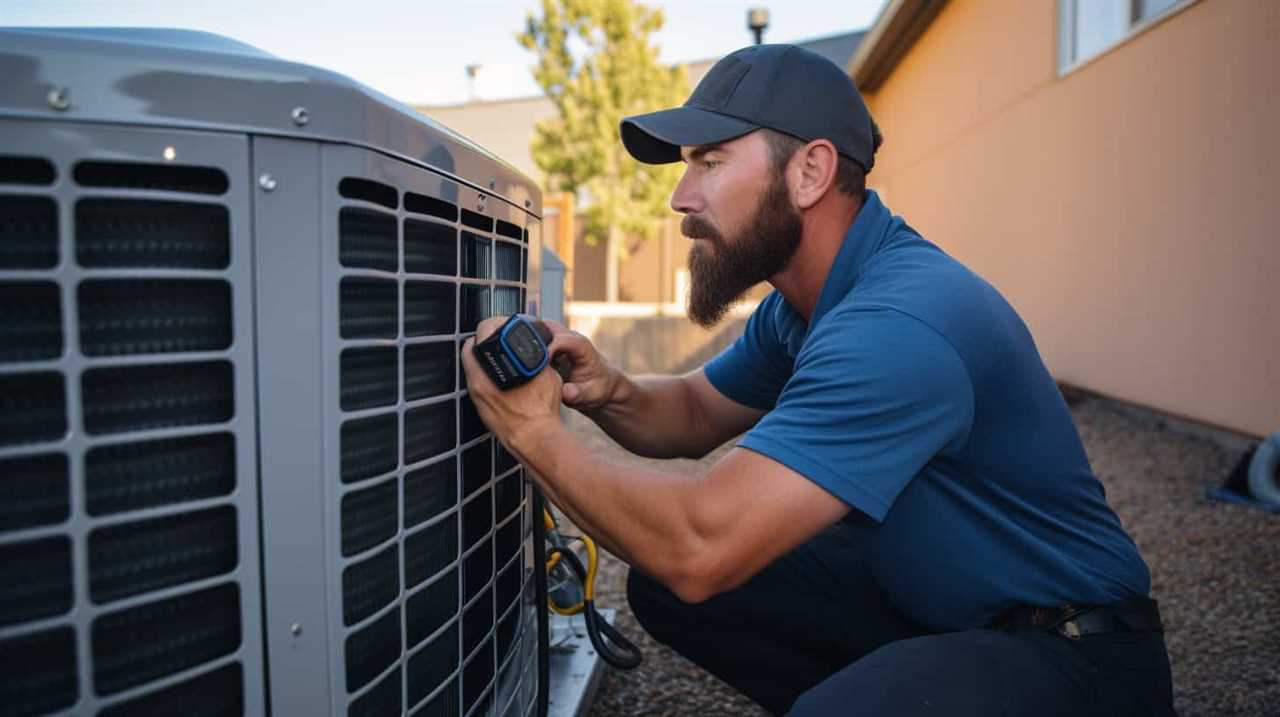
-
Resource depletion: Evaluating the extent to which the renewable energy solution relies on finite resources and its potential to deplete them over time.
-
Ecological impact: Examining the effects of the renewable energy solution on local ecosystems, including habitat disruption, biodiversity loss, and water and air pollution.
By considering these factors, we can determine the true environmental impact of renewable energy solutions and make informed decisions about their implementation.
This evaluation process is crucial in ensuring that our pursuit of renewable energy aligns with our goal of creating a sustainable and innovative future.
Frequently Asked Questions
What Are the Specific Installation Costs Associated With Heat Pump Systems Powered by Renewable Energy Sources?
Cost comparison for heat pump systems powered by renewable energy sources is an important consideration. We analyze specific installation costs to determine the most efficient and cost-effective solutions. Renewable energy options offer innovative and sustainable alternatives.
How Do Heat Pumps Powered by Renewable Energy Sources Compare to Traditional Heating Systems in Terms of Efficiency and Performance?
Heat pumps powered by renewable energy sources outperform traditional heating systems in terms of energy efficiency. A comparison reveals that these innovative solutions offer superior performance, making them an ideal choice for environmentally conscious consumers.
Are There Any Limitations or Drawbacks to Using Renewable Energy Sources for Heat Pumps?
There are some limitations and drawbacks to using renewable energy sources for heat pumps. These can include higher upfront costs, limited availability of certain energy sources, and potential fluctuations in energy supply.
What Are the Maintenance Requirements for Heat Pump Systems Powered by Renewable Energy Sources?
Maintenance requirements for heat pump systems powered by renewable energy sources depend on the specific system and its components. Regular inspections, cleaning, and filter replacements are necessary to ensure optimal performance and energy efficiency.
Are There Any Government Incentives or Financial Assistance Programs Available for the Installation of Renewable Energy-Powered Heat Pump Systems?
There are indeed government incentives and financial assistance programs available for the installation of renewable energy-powered heat pump systems. These programs can provide significant support and make the transition to renewable energy more affordable for homeowners.
Conclusion
In conclusion, renewable energy solutions for heat pumps offer a ray of hope in our quest for sustainability.
Like a warm breeze on a cold winter day, solar energy, geothermal energy, wind energy, biomass, and hydroelectric power provide efficient and eco-friendly alternatives.
By harnessing these renewable sources, we can’t only meet the growing demand for heat pumps but also reduce our carbon footprint, paving the way for a greener and brighter future.
Renewable Energy Sources
Green Heating: A Guide to Eco-Friendly Heat Pumps

Did you know that heat pumps are considered to be one of the most energy-efficient heating options available?
In our guide to eco-friendly heat pumps, we’ll explore the benefits of this innovative technology and how it contributes to renewable energy.
From understanding the different types of heat pumps to tips for maximizing energy efficiency and cost savings, we’ve got you covered.
Join us as we delve into the world of green heating and discover how heat pumps can revolutionize your home’s heating system.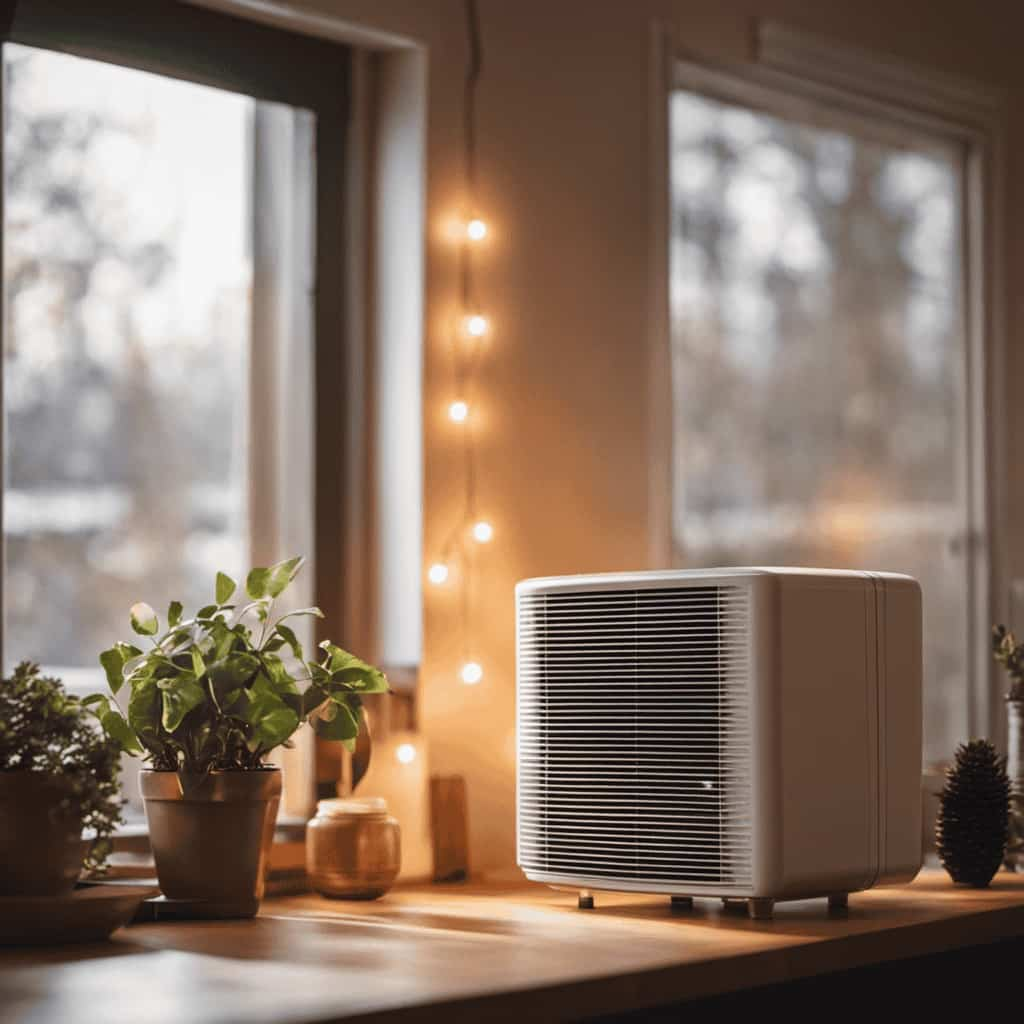
Key Takeaways
- Heat pumps are versatile and cost-effective, providing both heating and cooling capabilities.
- Heat pumps use natural heat sources and have lower carbon emissions compared to traditional heating methods, contributing to renewable energy.
- There are different types of heat pumps to consider, such as air source, ground source, and water source, with varying efficiency and cost factors.
- Energy efficiency ratings, such as SEER and HSPF, play a vital role in reducing energy consumption and utility bills, so it’s important to look for higher ratings for optimal energy efficiency.
The Basics of Eco-Friendly Heat Pumps
Let’s dive into the basics of eco-friendly heat pumps, which provide efficient and sustainable heating for homes. Understanding heat pump technology is key to appreciating the benefits of eco-friendly heating.
Heat pumps work by transferring heat from one area to another using refrigerant and a compressor. During the winter, they extract heat from the outdoor air or ground and transfer it inside, effectively warming the living space. In the summer, the process is reversed, with heat being removed from the indoor air and released outside. This dual function makes heat pumps versatile and cost-effective.
How Heat Pumps Contribute to Renewable Energy
Heat pumps contribute to renewable energy by utilizing natural heat sources, such as air, water, or the ground, to provide sustainable heating for homes. This innovative technology offers several benefits for both homeowners and the environment:
- Reduced reliance on fossil fuels: Heat pumps tap into renewable energy sources, reducing the need for traditional heating systems that rely on fossil fuels.
- Lower carbon emissions: By utilizing renewable energy, heat pumps have a significantly lower environmental impact compared to conventional heating methods.
- Energy efficiency: Heat pumps are highly efficient, converting a small amount of electricity into a larger amount of heat energy.
- Versatility: Heat pumps can provide both heating and cooling, making them a versatile solution for year-round comfort.
Understanding the different types of heat pumps will help you choose the most suitable option for your home’s heating needs.
Understanding the Different Types of Heat Pumps
When it comes to understanding the different types of heat pumps, two key points to consider are efficiency and cost.
Heat pump efficiency varies depending on the type, with ground source heat pumps typically being the most efficient.
However, air source heat pumps are generally more affordable upfront.
Efficiency of Heat Pumps
We can improve the efficiency of heat pumps by understanding the various types and their unique features. Here are some key factors to consider:
-
Heat pump technology: Different heat pumps use different technologies, such as air source, ground source, or water source. Understanding how each technology works can help you choose the most efficient option for your needs.
-
Energy savings: Heat pumps are known for their energy-saving capabilities. However, the level of energy savings can vary depending on factors like the size and insulation of your home, as well as the climate in your area. By understanding these factors, you can optimize the energy efficiency of your heat pump.
-
Seasonal performance factor (SPF): The SPF measures the efficiency of a heat pump over an entire heating season. Look for heat pumps with a higher SPF to ensure maximum efficiency.
-
Variable-speed technology: Heat pumps with variable-speed compressors can adjust their output based on the heating or cooling demand. This technology improves efficiency by reducing energy consumption during periods of lower demand.

Cost Comparison Between Types
To accurately compare the costs between different types of heat pumps, it’s important to consider factors such as installation, maintenance, and energy efficiency.
When conducting a cost analysis, it’s crucial to assess the initial investment required for purchasing and installing each type of heat pump. While some may have a higher upfront cost, they may offer greater energy efficiency and lower maintenance expenses in the long run.
Additionally, it’s essential to calculate the payback period for each heat pump type, which is the time it takes for the energy savings to cover the initial investment.
Factors to Consider When Choosing an Eco-Friendly Heat Pump
When choosing an eco-friendly heat pump, there are several factors to consider.
First, it’s important to look at the energy efficiency ratings of the heat pump. This will give you an idea of how effectively it can convert energy into heat.
Second, you should consider the different types of heat pumps available, such as air source, ground source, or water source heat pumps. Each type has its own advantages and disadvantages, so it’s important to choose one that suits your specific needs.
Lastly, you should also think about the installation and maintenance requirements of the heat pump, as this can affect its performance and longevity.
Energy Efficiency Ratings
Typically, homeowners should prioritize energy efficiency ratings when selecting an eco-friendly heat pump. Energy efficiency standards play a vital role in ensuring that a heat pump operates at its maximum efficiency, resulting in lower energy consumption and reduced utility bills.

Here are four key factors to consider when evaluating the energy efficiency of a heat pump:
-
Seasonal Energy Efficiency Ratio (SEER): This rating measures the cooling efficiency of a heat pump. Higher SEER ratings indicate better energy efficiency.
-
Heating Seasonal Performance Factor (HSPF): HSPF measures the heating efficiency of a heat pump. Look for a higher HSPF rating to ensure optimal energy efficiency during colder months.
-
Energy Star Certification: Choosing an Energy Star-certified heat pump guarantees that it meets or exceeds strict energy efficiency guidelines set by the Environmental Protection Agency (EPA).

-
Variable Speed Technology: Heat pumps with variable speed compressors adjust their performance based on the heating or cooling needs, resulting in greater energy efficiency.
Considering these factors will help homeowners make an informed decision when selecting an eco-friendly heat pump.
Now, let’s explore the different types of heat pumps available in the market.
Types of Heat Pumps
Let’s explore the different types of heat pumps available in the market and consider important factors when choosing an eco-friendly heat pump.
When it comes to heat pumps, there are three main types to consider: air source, ground source, and water source. Air source heat pumps are the most common and cost-effective option, while ground source heat pumps offer higher efficiency but require more extensive installation requirements. Water source heat pumps, on the other hand, utilize nearby water bodies for heat transfer, making them a great option for properties near lakes or rivers.
Efficiency comparison is a crucial factor to consider when choosing a heat pump, as it directly impacts energy consumption and cost savings. Additionally, installation requirements such as available space, ductwork, and electrical capacity should be carefully evaluated to ensure a suitable fit for your property.
Now that we’ve covered the different types of heat pumps and factors to consider, let’s move on to discussing installation and maintenance.
Installation and Maintenance
We prefer to thoroughly assess the installation and maintenance requirements before selecting an eco-friendly heat pump. Proper installation techniques are crucial to ensure optimal performance and energy efficiency.
Here are some important factors to consider when installing and maintaining an eco-friendly heat pump:
-
Sizing: It’s essential to choose the right size heat pump for your specific heating and cooling needs. Oversized or undersized units can lead to reduced efficiency and increased energy consumption.
-
Location: The location of the heat pump is crucial for efficient operation. It should be placed in a well-ventilated area, away from obstructions, and protected from extreme weather conditions.
-
Regular maintenance: Regular maintenance is vital to keep the heat pump operating at peak performance. This includes cleaning or replacing filters, checking refrigerant levels, and inspecting electrical connections.

-
Troubleshooting tips: Familiarize yourself with common troubleshooting tips, such as checking for air leaks, ensuring proper thermostat settings, and clearing debris from outdoor units.
By considering these installation and maintenance factors, you can ensure the longevity and energy efficiency of your eco-friendly heat pump.
Now, let’s explore the energy efficiency benefits of heat pumps.
The Energy Efficiency Benefits of Heat Pumps
Heat pumps offer significant energy efficiency benefits, making them an ideal choice for environmentally conscious homeowners. Not only do they provide efficient heating and cooling, but they also help reduce energy consumption and lower utility bills. By harnessing the natural heat from the air or ground, heat pumps can achieve energy savings of up to 50% compared to traditional heating systems. This has a positive environmental impact by reducing greenhouse gas emissions and reliance on fossil fuels.
To better understand the energy efficiency benefits of heat pumps, let’s take a look at the following table:
| Energy Efficiency Benefits | Description | Impact |
|---|---|---|
| Lower energy consumption | Heat pumps use significantly less energy compared to other heating systems, resulting in reduced energy bills and overall energy savings. | Cost-effective and reduced environmental impact |
| Renewable energy source | Heat pumps rely on natural heat sources such as air or ground, making them a sustainable and renewable heating option. | Reduced carbon footprint and increased sustainability |
| Versatile applications | Heat pumps can provide both heating and cooling, eliminating the need for separate systems. This versatility optimizes energy usage and efficiency. | Enhanced comfort and energy savings |
With their energy efficiency benefits, heat pumps are not only a smart choice for homeowners but also contribute to a greener and more sustainable future.
Proper Installation and Maintenance of Heat Pumps
When it comes to heat pumps, proper installation and maintenance are crucial for ensuring energy-efficient operation and prolonging the equipment’s lifespan.
By following manufacturer guidelines and hiring certified professionals, we can ensure that the heat pump is installed correctly and functions at its optimal efficiency.
Additionally, regular maintenance, such as cleaning filters and inspecting components, helps identify any potential issues early on, reducing the risk of costly repairs and maximizing the heat pump’s performance.
Ensuring Energy-Efficient Operation
To ensure the energy-efficient operation of your heat pump, it’s crucial to properly install and regularly maintain it. Here are some key tips to follow:
-
Choose the right size: Ensure that your heat pump is properly sized for your specific heating and cooling needs. An oversized or undersized unit can lead to inefficiencies and increased energy consumption.
-
Keep the air filters clean: Regularly clean or replace the air filters in your heat pump. Clogged filters can restrict airflow and reduce efficiency.

-
Maintain outdoor unit: Keep the outdoor unit clear of debris, such as leaves and grass clippings, to ensure proper airflow. This allows the heat pump to operate more efficiently.
-
Schedule professional maintenance: Arrange for annual maintenance check-ups by a qualified technician. They can inspect, clean, and tune-up your heat pump to keep it running at peak performance.
Prolonging Equipment Lifespan
To ensure a longer lifespan for our heat pumps, it is essential to properly install and regularly maintain them. By following proper installation practices and conducting routine maintenance, we can prolong equipment efficiency and increase equipment longevity. Proper installation involves ensuring correct sizing, proper placement, and appropriate insulation. Regular maintenance includes cleaning or replacing filters, checking and lubricating motors, inspecting electrical connections, and scheduling professional tune-ups. Additionally, it is important to regularly monitor and optimize the heat pump’s performance through energy management systems or smart thermostats. By taking these steps, we can maximize the lifespan of our heat pumps, reduce energy consumption, and minimize the need for costly repairs or replacements.
| Installation Practices | Routine Maintenance | Performance Optimization |
|---|---|---|
| 1. Correct sizing | 1. Cleaning/replacing filters | 1. Monitoring energy usage |
| 2. Proper placement | 2. Checking/lubricating motors | 2. Utilizing energy management systems |
| 3. Appropriate insulation | 3. Inspecting electrical connections | 3. Using smart thermostats |
Maximizing the Performance of Your Heat Pump
We can maximize the performance of our heat pump by following these simple tips:

-
Regular maintenance: Schedule annual maintenance checks by a professional to ensure optimal efficiency and troubleshoot any potential issues.
-
Clean and clear surroundings: Keep the area around the heat pump free from debris, leaves, and other obstructions that can hinder its performance.
-
Regularly clean filters: Dirty filters can reduce airflow, decreasing efficiency. Clean or replace filters as recommended by the manufacturer.
-
Optimize thermostat settings: Set your thermostat to a comfortable temperature, avoiding extreme highs or lows, to avoid overworking the heat pump.

By implementing these tips, we can improve the efficiency of our heat pump and troubleshoot any potential problems, ensuring that it operates at its best performance.
Take these steps to maximize the lifespan and effectiveness of your heat pump while reducing energy consumption.
Cost-Saving Tips for Using Heat Pumps
Two of the most effective ways to save costs when using heat pumps are by properly insulating your home and utilizing a programmable thermostat.
By insulating your home, you can prevent heat loss and maximize the efficiency of your heat pump. This can be achieved by sealing gaps and cracks, adding insulation to walls and attics, and ensuring that windows and doors are properly weather-stripped.
Additionally, using a programmable thermostat allows you to set different temperatures for different times of the day, ensuring that you’re only using energy when needed. This can lead to significant energy savings over time.
By implementing these energy-saving techniques, you can’t only reduce your heating costs but also contribute to a more sustainable future.
Now, let’s dive into comparing heat pumps to traditional heating systems.
Comparing Heat Pumps to Traditional Heating Systems
Let’s compare heat pumps to traditional heating systems and see how they differ in terms of efficiency and environmental impact.
-
Heat pumps are more energy efficient than traditional heating systems. They work by transferring heat from the outside air or ground to warm the inside of a building, instead of generating heat from fossil fuels like gas or oil. This results in lower energy consumption and reduced carbon emissions.
-
Traditional heating systems, on the other hand, rely on the combustion of fossil fuels to produce heat. This process is less efficient and contributes to air pollution and greenhouse gas emissions.
-
Heat pumps can also provide cooling in the summer, making them a versatile option for year-round comfort.
-
Traditional heating systems often require separate air conditioning units for cooling, increasing energy consumption and costs.

Eco-Friendly Heat Pumps and Indoor Air Quality
Using eco-friendly heat pumps can improve indoor air quality and reduce environmental impact. Heat pumps operate by transferring heat from one source to another, providing both heating and cooling capabilities. Unlike traditional heating systems that rely on combustion, heat pumps use electricity to move heat, resulting in cleaner and healthier indoor air. By eliminating the need for fossil fuels, eco-friendly heat pumps help reduce air pollution and greenhouse gas emissions. In addition to the environmental benefits, these heat pumps also offer health benefits. They filter and circulate the air, removing dust, allergens, and other pollutants, resulting in cleaner and fresher air. This can lead to improved respiratory health, reduced allergies, and a more comfortable living environment. See the table below for a summary of the health benefits of eco-friendly heat pumps.
| Health Benefits of Eco-Friendly Heat Pumps |
|---|
| Improved indoor air quality |
| Reduced allergies and respiratory issues |
| Cleaner and fresher air |
Incorporating eco-friendly heat pumps into your home not only helps to protect the environment but also provides a healthier and more comfortable living space. By improving indoor air quality and reducing the presence of pollutants, these heat pumps promote a more sustainable and innovative way of heating and cooling.
Exploring Incentives and Rebates for Eco-Friendly Heat Pumps
We have found three incentives and rebates available for eco-friendly heat pumps that can help homeowners save money on their installation and operation costs. Here are some options to explore:
-
Federal Tax Credits: The federal government offers tax credits for installing energy-efficient heat pumps. Homeowners can receive up to 30% of the cost of the equipment and installation as a tax credit.
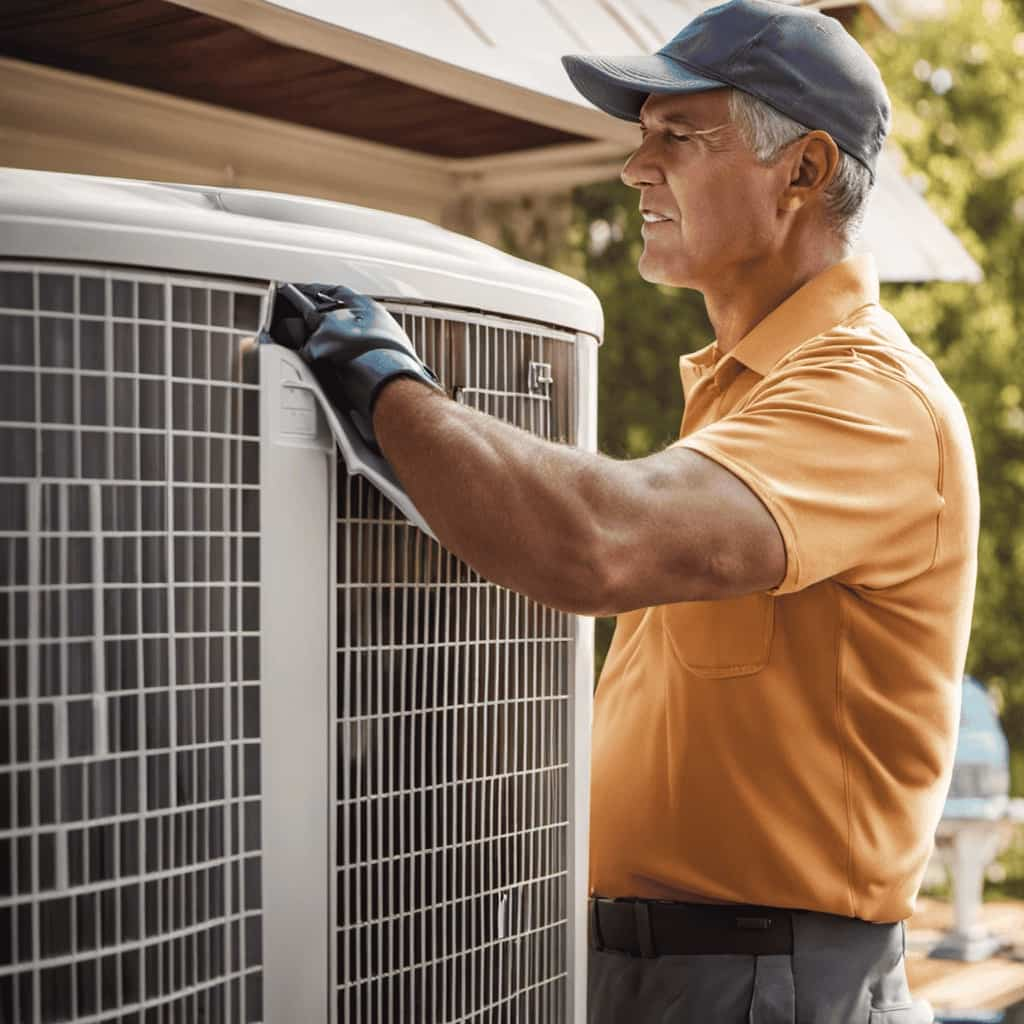
-
State and Local Rebates: Many states and local authorities offer rebates for eco-friendly heat pump installations. These rebates can vary in amount and eligibility criteria, so it’s important to research what’s available in your area.
-
Utility Company Incentives: Some utility companies provide incentives for installing energy-efficient heat pumps. These incentives could include cash rebates or reduced electricity rates for heat pump users.
-
Financing Options: In addition to incentives and rebates, exploring financing options can help make the upfront cost of eco-friendly heat pumps more affordable. Many financial institutions offer loans and financing plans specifically for energy-efficient home improvements.
By researching these incentives, rebates, and financing options, homeowners can find cost-effective ways to install and operate eco-friendly heat pumps.
Case studies of successful installations can provide real-world examples of the benefits and savings associated with these systems.
Frequently Asked Questions
Are Heat Pumps Suitable for All Types of Climate?
Heat pumps can be suitable for all types of climates. In extreme climates, heat pumps may require supplemental heating. However, in mild climates, the benefits of heat pumps, such as energy efficiency and reduced carbon emissions, can be maximized.
Can Heat Pumps Be Used for Both Heating and Cooling Purposes?
Yes, heat pumps can be used for both heating and cooling purposes. They are efficient and can save energy. With a heat pump, you can enjoy comfortable temperatures all year round while reducing your carbon footprint.
How Long Does a Heat Pump Typically Last?
Heat pumps typically last around 15-20 years with proper maintenance. Signs of heat pump failure include reduced heating or cooling efficiency, strange noises, and frequent breakdowns. Regular maintenance can help prolong the lifespan of a heat pump.
How Noisy Are Heat Pumps During Operation?
During operation, heat pumps can produce varying noise levels. However, there are soundproofing options available to minimize any potential disturbances. Our guide provides innovative solutions to ensure a peaceful and eco-friendly heating experience.
Are There Any Government Regulations or Certifications for Eco-Friendly Heat Pumps?
There are government regulations and certifications for eco-friendly heat pumps. One of the most recognized certifications is the Energy Star certification, which ensures that the heat pump meets certain energy efficiency standards set by the government.
Conclusion
In conclusion, eco-friendly heat pumps are a practical and efficient solution for heating your home while reducing your carbon footprint.
Like a gentle breeze on a warm summer day, these heat pumps harness renewable energy sources to provide reliable and sustainable heating.

By understanding the different types of heat pumps and considering factors such as energy efficiency and cost savings, you can make an informed choice that benefits both the environment and your wallet.
So, why not make the switch to eco-friendly heat pumps and enjoy a greener way of heating your home?
Renewable Energy Sources
Harnessing the Sun: Revolutionizing Heat Pumps

Imagine a future where solar power is used to power heat pumps, providing homes and businesses with efficient and sustainable heating and cooling solutions.
In this article, we explore the revolutionary technology of solar-powered heat pumps and how they are transforming the way we harness energy. By integrating solar energy into heat pump systems, we are not only increasing their efficiency but also reducing our carbon footprint.
Join us as we delve into the exciting world of solar-powered heating and cooling and the endless possibilities it holds for a greener future.
Key Takeaways
- Solar-powered heat pumps increase efficiency and reduce carbon footprint.
- Solar heat pumps provide a greener alternative to fossil fuel-based systems, combat climate change, and improve air quality.
- Government incentives and tax credits make installation more affordable and encourage widespread adoption.
- Technological advancements in solar heat pumps include improved efficiency, integration with smart home systems, enhanced durability, and the development of hybrid systems combining solar with other renewable energy sources.
The Solar Energy Advantage
We’re excited to explore the solar energy advantage in revolutionizing heat pumps.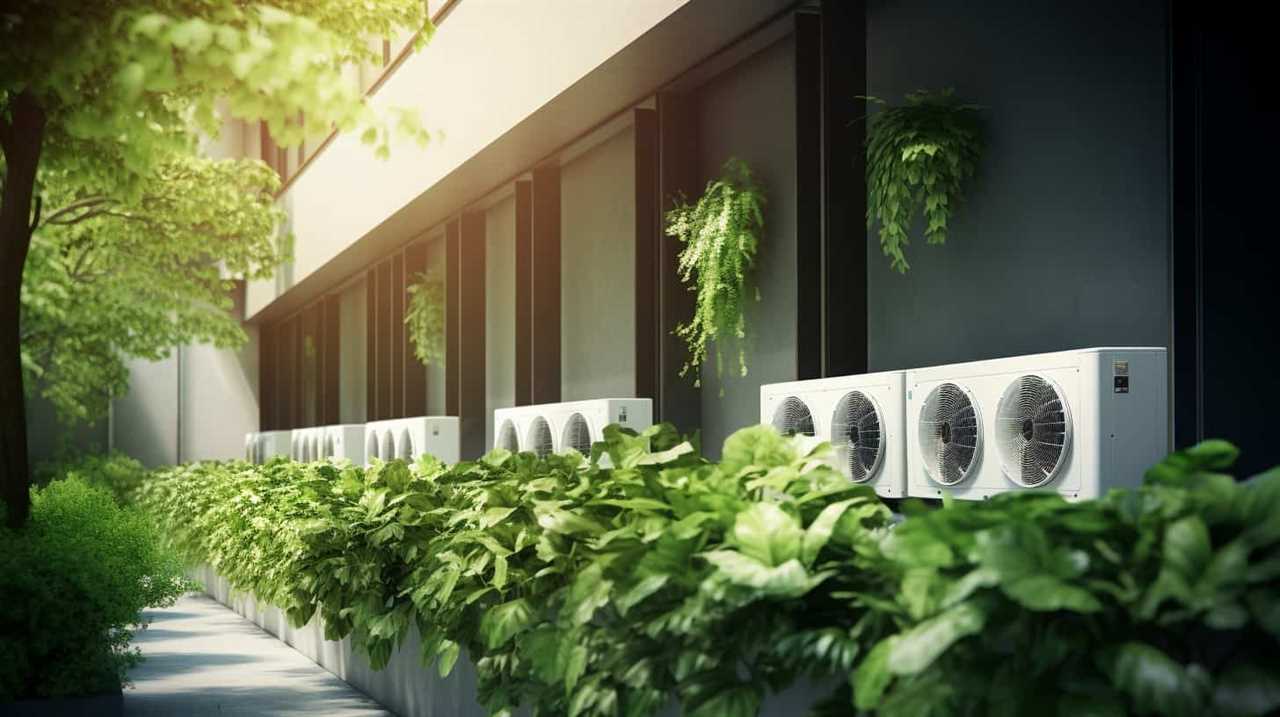
Solar energy storage plays a crucial role in this innovation. By harnessing the power of the sun, heat pumps can operate more efficiently and sustainably. Solar heat pump installations utilize photovoltaic panels to convert sunlight into electricity, which can then be used to power the heat pump system. This renewable energy source reduces dependency on fossil fuels and lowers carbon emissions.
Additionally, solar energy storage allows for excess energy generated during the day to be stored and used when sunlight isn’t available, ensuring a continuous supply of energy. This technological advancement not only benefits the environment but also provides cost savings for homeowners and businesses.
The solar energy advantage in revolutionizing heat pumps opens up new possibilities for sustainable heating and cooling solutions.
Solar-Powered Heat Pump Technology
Solar-powered heat pump technology combines the efficiency of heat pumps with the renewable energy of solar power. This innovative approach to heating systems offers numerous benefits, making it an attractive option for many homeowners.
Here are three key points to consider:
-
Increased energy efficiency: By harnessing the power of the sun, solar-powered heat pumps can achieve higher levels of efficiency compared to traditional heating systems. This translates to lower energy consumption and reduced utility bills.
-
Cost-effective installation: While the initial cost of installing a solar-powered heat pump may be higher than traditional systems, the long-term savings on energy bills can offset this expense. Additionally, government incentives and tax credits are often available to help make the installation more affordable.
-
Environmental sustainability: By relying on renewable solar energy, these heat pumps significantly reduce carbon emissions and help combat climate change. They provide a greener alternative to fossil fuel-based heating systems.
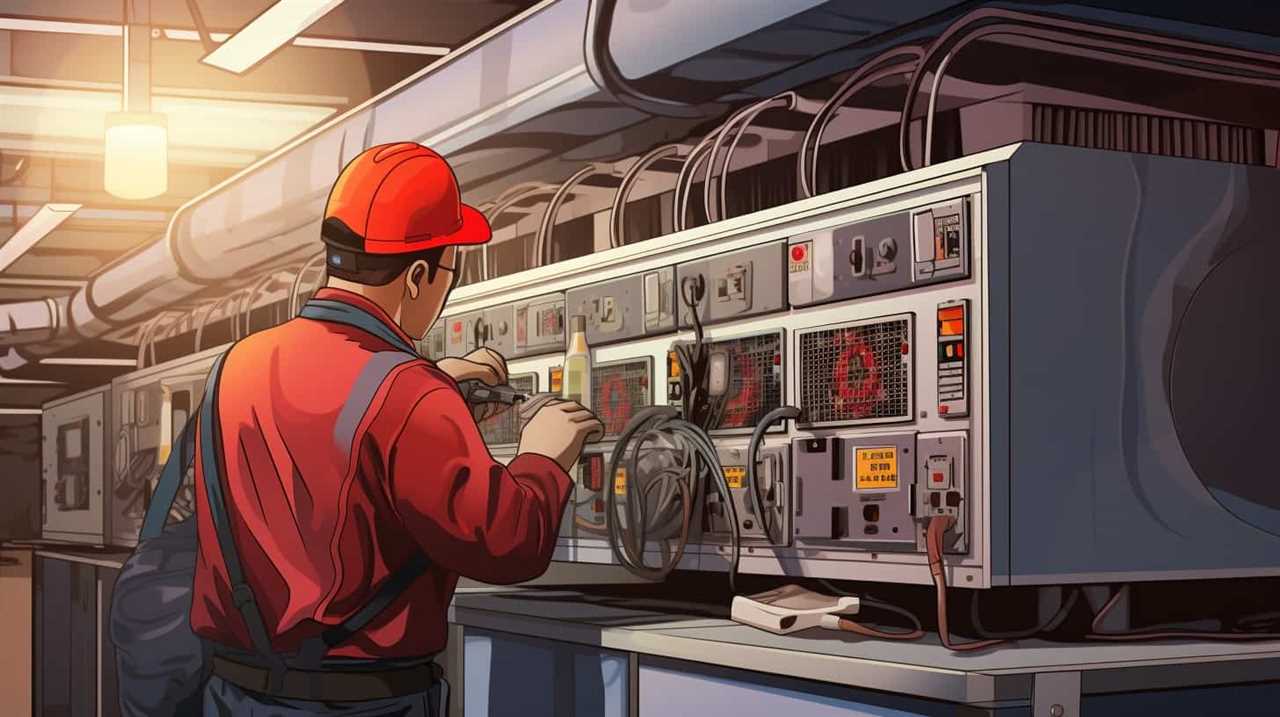
Investing in solar-powered heat pump technology not only offers cost savings but also contributes to a more sustainable future.
Increasing Efficiency With Solar Integration
By integrating solar technology, we can significantly enhance the efficiency of heat pumps. Solar thermal energy, a form of renewable energy, can be used to supplement the power required by heat pumps, reducing their energy consumption and increasing their overall efficiency. This integration allows heat pumps to harness the power of the sun to generate heat, reducing the reliance on traditional energy sources and decreasing greenhouse gas emissions. The table below summarizes the advantages of solar integration in heat pump systems:
| Advantages of Solar Integration |
|---|
| Reduced energy consumption |
| Increased overall efficiency |
| Lower greenhouse gas emissions |
Environmental Benefits of Solar Heat Pumps
Solar heat pumps offer significant environmental benefits, reducing carbon emissions and reliance on fossil fuels for heating and cooling systems. Here are three key reasons why solar heat pumps are a game-changer:
-
Reduced carbon footprint: By harnessing the power of the sun, solar heat pumps eliminate the need for traditional fossil fuel-based heating and cooling systems. This leads to a significant reduction in carbon emissions, helping combat climate change and improving air quality.
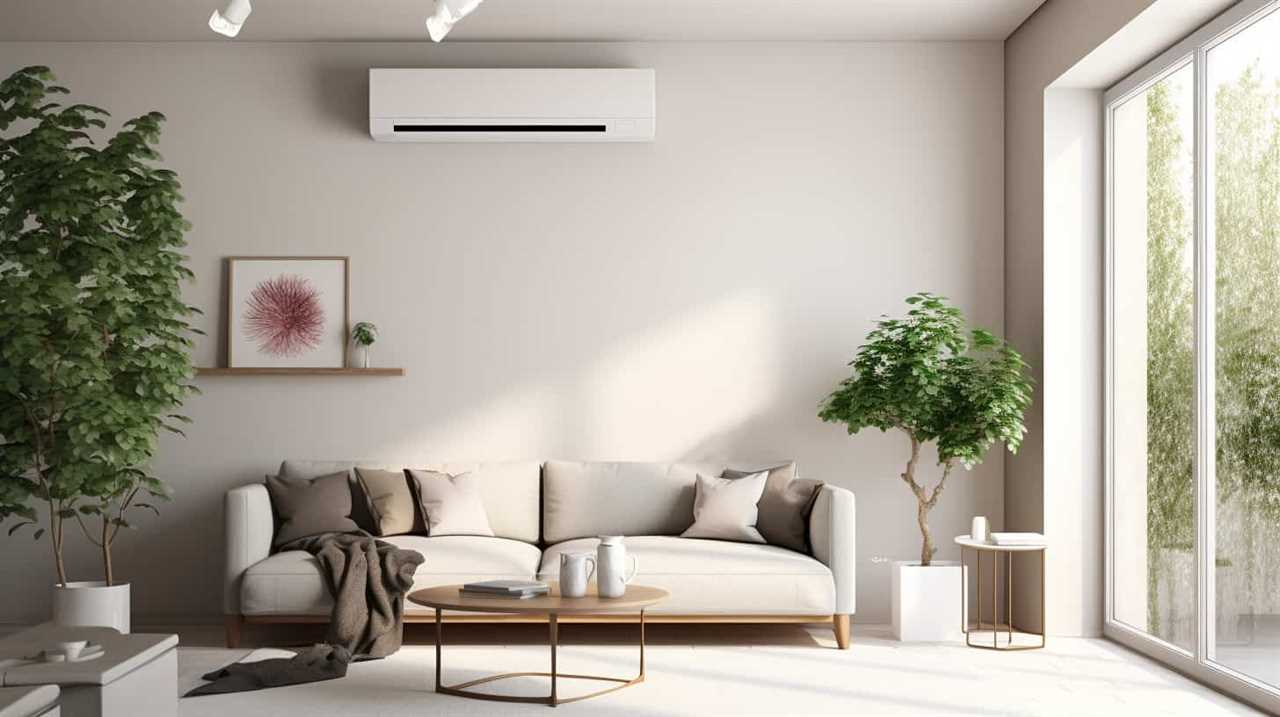
-
Energy efficiency: Solar heat pumps operate at a high level of energy efficiency, converting solar energy into usable heat or cool air. This not only reduces energy consumption but also lowers utility bills for homeowners and businesses.
-
Cost-effectiveness: While the initial installation cost of solar heat pumps may be higher compared to traditional systems, the long-term savings on energy bills make it a cost-effective investment. Additionally, with advancements in technology and increased demand, the cost of solar heat pump installation is gradually decreasing, making it more accessible to a wider audience.
The Future of Solar-Powered Heating and Cooling
As technology advances and renewable energy becomes more prevalent, the future of heating and cooling systems is poised for a solar-powered revolution. Solar powered HVAC systems are emerging as a viable alternative to traditional heating and cooling methods. These systems utilize solar energy to generate heat or cold, reducing dependence on fossil fuels and lowering greenhouse gas emissions.
The key to widespread adoption lies in the role of government incentives in promoting solar heat pumps. Governments can provide financial incentives, such as tax credits or subsidies, to encourage homeowners and businesses to invest in solar-powered heating and cooling systems. These incentives can offset the initial cost of installation and make solar heat pumps more affordable and accessible.

Frequently Asked Questions
How Much Does It Cost to Install a Solar-Powered Heat Pump System?
Installing a solar-powered heat pump system can be cost-effective in the long run, despite the initial upfront costs. By harnessing the sun’s energy, it reduces electricity bills and provides significant environmental benefits, making it a smart investment for those seeking innovation.
Can a Solar-Powered Heat Pump Reduce My Energy Bills?
A solar-powered heat pump can significantly reduce energy bills due to its ability to use the sun’s energy for heating and cooling. However, it’s important to consider the initial cost and potential limitations of this technology.
How Does Solar Integration in Heat Pumps Affect the Lifespan of the System?
Solar integration in heat pumps can significantly extend the lifespan of the system. By harnessing the sun’s energy, the system operates more efficiently, reducing wear and tear. Additionally, it decreases the system’s carbon footprint, making it a sustainable and innovative solution.
Are There Any Government Incentives or Tax Credits Available for Installing Solar-Powered Heat Pumps?
Yes, there are government incentives and tax credits available for installing solar-powered heat pumps. These incentives can help offset the upfront costs and make the transition to renewable energy more affordable.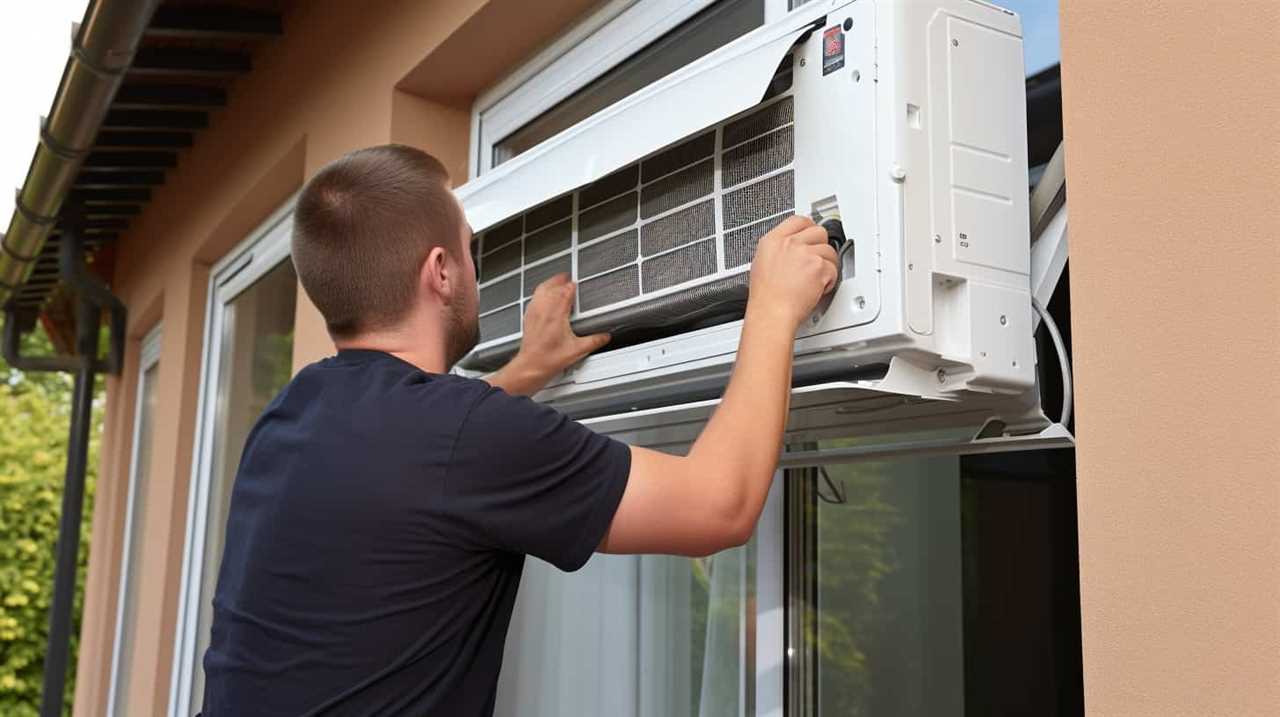
Can a Solar-Powered Heat Pump Be Used in Areas With Limited Sunlight?
A solar-powered heat pump can still be used in areas with limited sunlight. Although the efficiency may be reduced, the benefits of using a solar heat pump in off-grid areas include energy independence and reduced reliance on traditional energy sources.
Conclusion
In conclusion, solar-powered heat pumps are revolutionizing the way we heat and cool our homes. By harnessing the power of the sun, these innovative systems offer increased efficiency and environmental benefits.
With the integration of solar technology, heat pumps are becoming more cost-effective and sustainable, reducing our reliance on traditional energy sources.
As we look to the future, solar-powered heating and cooling will play a significant role in creating a more sustainable and energy-efficient world.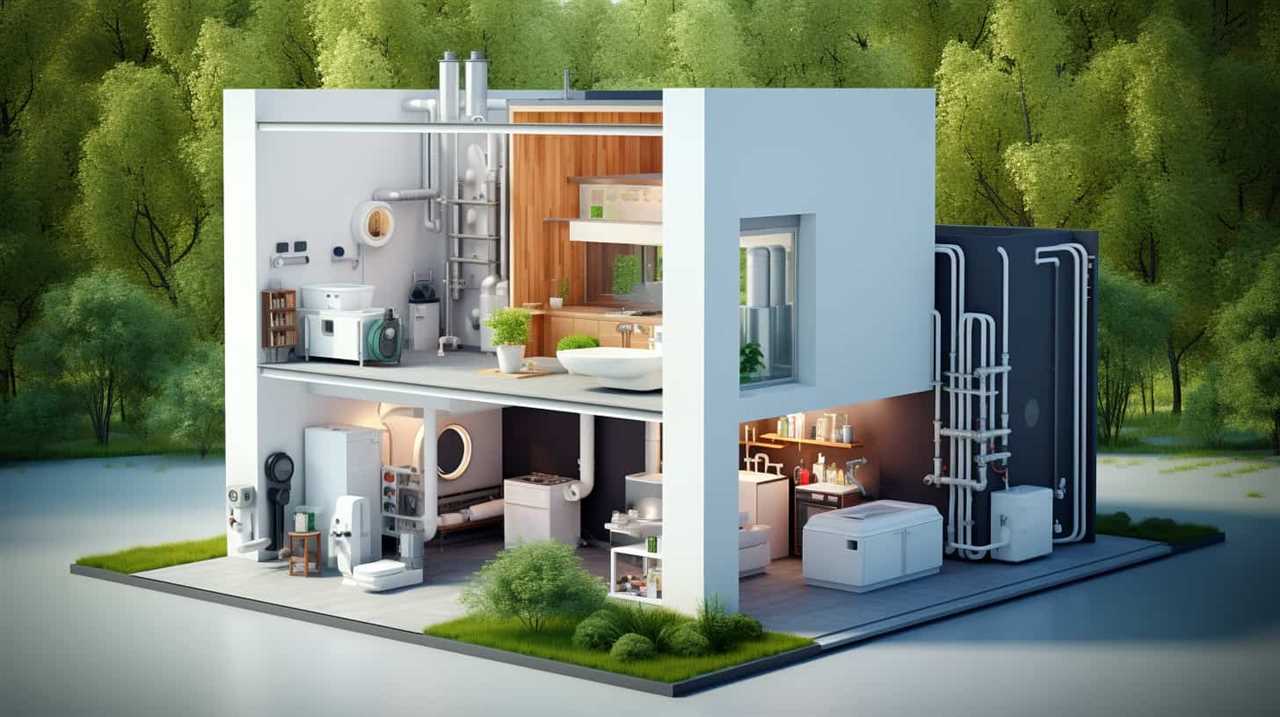
It’s time to embrace this anachronism and step into a brighter, greener future.
-

 Residential and Commercial Applications3 months ago
Residential and Commercial Applications3 months agoBest Amana Heat Pump Reviews
-

 Thermal Energy Transfer3 months ago
Thermal Energy Transfer3 months agoBreakthroughs in Modern Heat Pump Systems: Thermal Energy Edition
-

 Residential and Commercial Applications3 months ago
Residential and Commercial Applications3 months agoBest Heat Pump
-

 Geothermal Heat Pumps2 months ago
Geothermal Heat Pumps2 months agoUpgrade Your Comfort with Our Efficient HVAC Systems
-

 Geothermal Heat Pumps2 months ago
Geothermal Heat Pumps2 months agoInnovative Geothermal Heat Pump Manufacturers Revolutionize Energy Efficiency
-

 Air Conditioning4 weeks ago
Air Conditioning4 weeks agoExploring Energy-Efficient Air Conditioning Heat Pumps
-

 Thermal Energy Transfer3 months ago
Thermal Energy Transfer3 months agoBoost Your Heat Pump Efficiency: Interactive Guide
-

 Residential and Commercial Applications3 months ago
Residential and Commercial Applications3 months agoBest Portable Heat Pump Heat & AC











